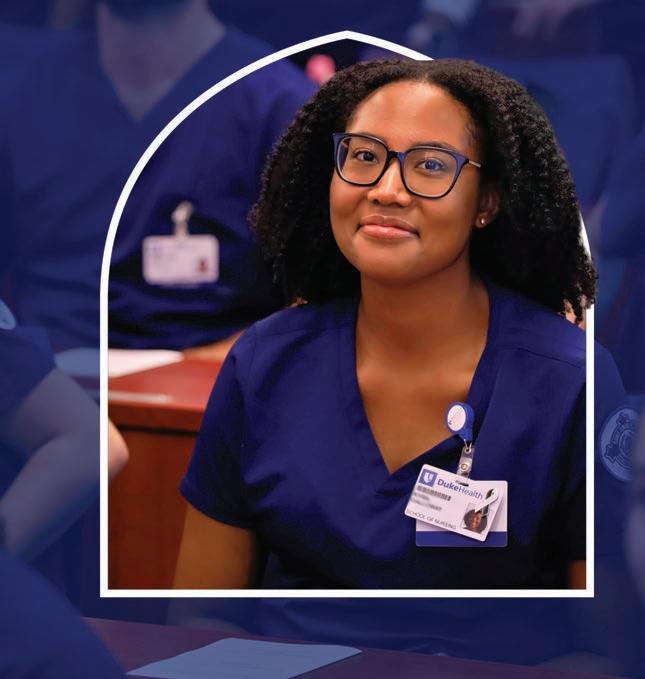

DUKE

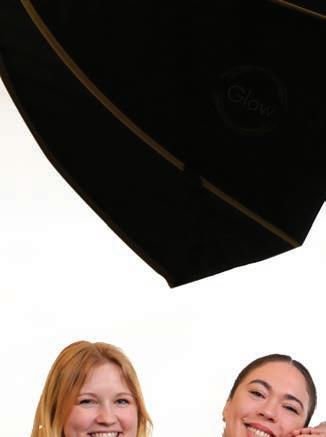
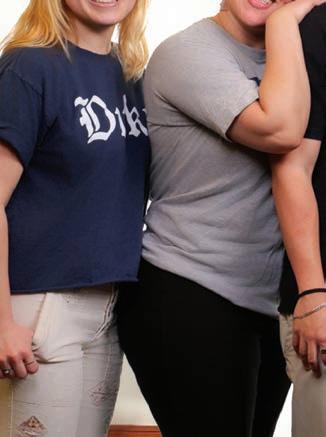
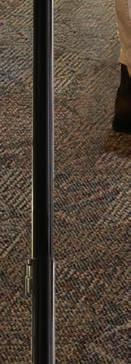





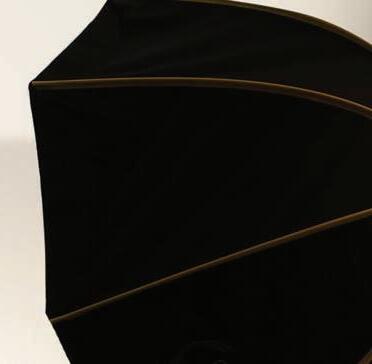

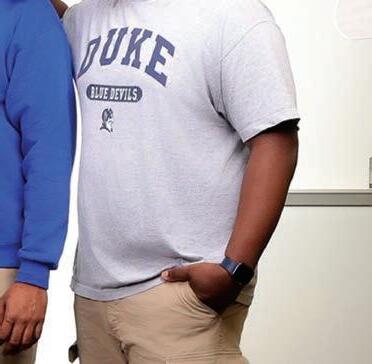
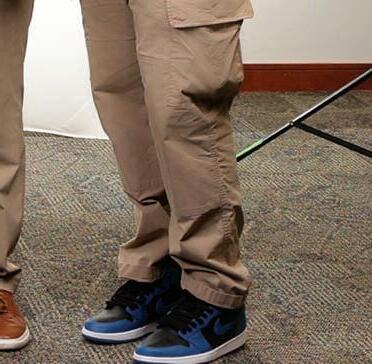



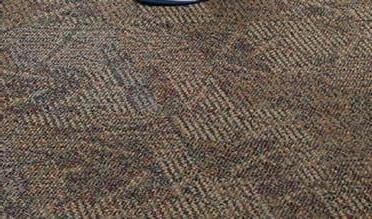

NURSING ALUMNI COUNCIL
PRESIDENT
Andrew R. Benson, MSN’09
VICE PRESIDENT
Heather B. Keyser, MSN’95
PRESIDENT-ELECT
Nicholas Charles Biondo, BSN’24
MEMBERS
Reesa E. Artz, BSN’24
Julie Diana Baker, BSN’10, MSN’13, DNP’20
LaShanda Cobbs, MSN'04, DNP'14
Sandra Alison Davis, BSN'82
Meghna Patel, BSN'14
William Beauregard Rowe, DNP'20
Marcelle P. Scheyer, MSN'16
Nikolas James Silva, BSN'20
Robert Frederick Stern, BSN'19
Judith A. Thorpe, BSN’77
Melisa Andrea Wilson, DNP’20
EMERITI MEMBERS
Sally Ann Bender Addison, BSN'60
Sandra Smith Averitt, BSN'67
Nancy S. Coll, BSN’68
Nancy Jo Davenport, BSN'67, MSN'69
Kathleen E. V. Gallagher, BSN'75
Susan M. Glover, BSN'70
Constance Cabell Kendall, BSN'84
Carole Ann Klove, JD, BSN'80
Virginia B. Lang, BSN'67
Aliki H. Martin, DNP'13
Marilyn R. McIlvaine, BSN'58
M. Christine Fulgencio Miller, MSN'99
Barbara Nims, BSN'71
Christine S. Pearson, BSN'84
Susan Johnston Rainey, BSN'70
Martha Cohn Romney, BSN'77
Ruth Calvin Scharf, BSN'80
E. Dorsey Smith-Seed, BSN'60
Judith Krebs Snyderman, H-SON’19
Joan M. Stanley, BSN'71
Martha Shawger Urbaniak, BSN'67
Marianne Tango Williams, BSN'81
Barbara Dimmick Yowell, BSN'62
Karen Becky Zagor, BSN'80
BOARD OF VISITORS
Lynn K. Erdman, H-SON’19, Chair
Guy C. Arnall, Jr., BA’85
Amy E. Bell, DNP’17
Michelle Chulick, BSN’77
Kevin P. Conlin, MHA’82
Saju D. Joy, MBA’14
Pilar Rocha-Goldberg
Pamela T. Rudisill, DNP’12
Ruth C. Scharf, BSN’80
Carolyn Scott
Pamela M. Sutton-Wallace, MA’94
Orit R. Szulik
Jim Vanek, BS’01
EMERITI MEMBERS
Christy W. Bell
Charles C. McIlvaine, BA’87
Bimal R. Shah, MD’01, MBA’01
Brett Turnage Williams, BS’81
DUKE NURSING magazine
VOLUME 21 ISSUE NUMBER 1
EDITOR
Matt Lardie
EDITORIAL TEAM
Sara Aghajanian
Jessica Covil-Manset
Sarah Deuel
Lauren Knotts
Sarah Morrison
Mary Katherine Powers
CONTRIBUTING WRITERS
Wendy Graber
Troy Pinkins
Schenita Randolph
PHOTOGRAPHY
Andrew Buchanan
Ken Huth
Spatafora Media
GRAPHIC DESIGN
Sarah Chesnutt
ON THE COVER: ABSN Spring 2025 graduates
KC Ward, Marieli Roman, Ivan Kobialka, Tyeshia Jones, Charan Reddi, and Parris Jones-Hammock




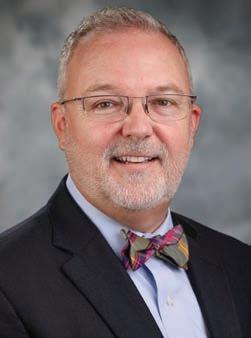
Dear Duke University School of Nursing Community,
AsI begin my journey as your new dean, I will draw on everything I have already learned from this wonderful community during my 17 years with the School, including my time as interim dean these past 19 months.
It is an honor to work alongside such a passionate, dedicated, and supportive community of students, alumni, friends, staff, and faculty committed to preparing the next generation of nurse leaders and innovators. As I begin this new chapter, I am also grateful to work with our leadership team across DUSON. I am confident that each of these leaders is the right person to help guide DUSON into its second century. Scan the QR code below to meet our leadership team.
While it is a challenging moment in higher education and healthcare, we have many exciting opportunities to lead and revolutionize in healthcare alongside our partners. You will certainly see these themes reflected in the Spring/Summer 2025 issue of Duke Nursing Magazine. In this issue, you’ll learn about how our school is lighting the way for healthcare leadership with impactful stories featuring our students, faculty, and alumni.
We explore topics including the importance of communicating with patients in their own language, how acupuncture can provide non-opioid-based relief from chronic pain, and how our faculty are incorporating social determinants of health into educational simulations. We also celebrate a groundbreaking partnership with colleagues in Rwanda, honor a new group of distinguished alumni with our annual Alumni Awards, and provide insight into an innovative new partnership between the school and the health system. We also celebrate a special gift supporting nursing science from Dean Emerita Ruby Wilson’s estate.
Our community of nurse clinicians, educators, and scientists has incredible power to impact healthcare here at Duke, nationwide, and globally. As we approach DUSON’s second century, I am eager to continue to advance our mission with our vibrant community.
Sincerely,

Michael V. Relf, PhD, RN, ANEF, FAAN
Mary T. Champagne Distinguished Professor of Nursing Dean of Duke University School of Nursing
Associate Chief Nurse Executive for Academic Partnerships and Innovation, Duke University Health System
Meet our DUSON leadership team >>

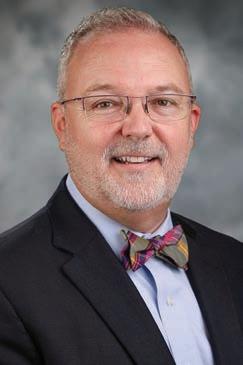
Q&A with Dean Michael Relf
Dean Michael Relf shares his thoughts on challenges and opportunities for the School as he begins his role as permanent Dean.
What motivated you to continue serving in this role?
DEAN RELF: After seventeen years here, it is truly a privilege to continue working alongside DUSON’s exceptional students, staff, faculty, and alumni to further our mission to advance health equity through transformative academic excellence, clinical practice, and nursing science. Our academic programs are among the best in the country and our work in global, community, and planetary health is grounded in partnership and community engagement. All of this is done with a commitment to fostering belonging and inclusive excellence among all members of this vibrant, passionate, and dedicated community. We have so many staunch allies across the University and at Duke Health who are supporting us, opening doors for us, and providing opportunities for innovation. I look forward to helping DUSON exceed our “outrageous ambitions.”
In an uncertain research landscape, how will the School continue to support nursing science in advancing health equity?
DEAN RELF: The work that the School is doing around health equity, social determinants of health, and nurse-led models of care continues to be critical. Nurse-led models of care can provide innovative solutions for healthcare access and quality. We’ll continue to support our faculty in extending their research programs and exploring new approaches.
DUSON will welcome its inaugural Master of Nursing (MN) class this fall. What excites you most about this new direction in nursing education?
DEAN RELF: Our goal is to prepare nurses who can lead at the bedside, in the community, and across the continuum of care. We have the opportunity to recruit the best and brightest individuals interested in nursing and professional practice, who have diverse skills and insights from different fields. With the MN program, we’re introducing a professional nurse who will have a different lens and skillset for the practice environment.
The University and Health System-wide campaign, MADE FOR THIS, has begun. What are the fundraising priorities for this campaign that will support the School’s broader ambitions?
DEAN RELF: Our priorities for the campaign focus on providing scholarships and support to attract the brightest students, advancing nursing science, and retaining top faculty through endowed professorships. These initiatives will prepare future nurse leaders, improve health outcomes, and drive impactful community initiatives. By investing in students, research, and faculty excellence, we can ensure the continued success and innovation of the School of Nursing and solidly prepare DUSON for its second century.
What are some ways that our alumni community can support the School?
DEAN RELF: Alumni can support DUSON by continuing to embody the DUSON mission in their own work. Whether you are supporting the school directly financially or making a difference at the bedside or in a clinic, you are transforming clinical practice, nursing education, and nursing science. Share your story with us. Keep in touch. In your lifetime, aim to mentor the next generation so that when you retire from nursing, there is a next cohort ready to carry on your passion. Please join us to recruit the best and brightest to advanced nursing practice.
Looking to the future, what are your wishes for DUSON five years from now?
DEAN RELF: I believe that we will not only have weathered the evolving higher education and research landscape, but we will have succeeded and thrived. DUSON is well-positioned to lead, innovate, and transform as we enter our second century (DUSON will celebrate its 100th anniversary in 2031). We will continue to do work that makes a meaningful difference in the world and in clinical practice. Over the last year, I have been grateful for opportunities to partner with Duke Health’s Chief Nurse Executive, Dr. Terry McDonnell, to foster innovation and clinical excellence. DUSON will continue to partner with Duke Health to ensure they have a strong nursing and advanced practice workforce. Our nurses will not only be caregivers, but leaders and innovators in today’s challenging environment.
Dean Michael Relf

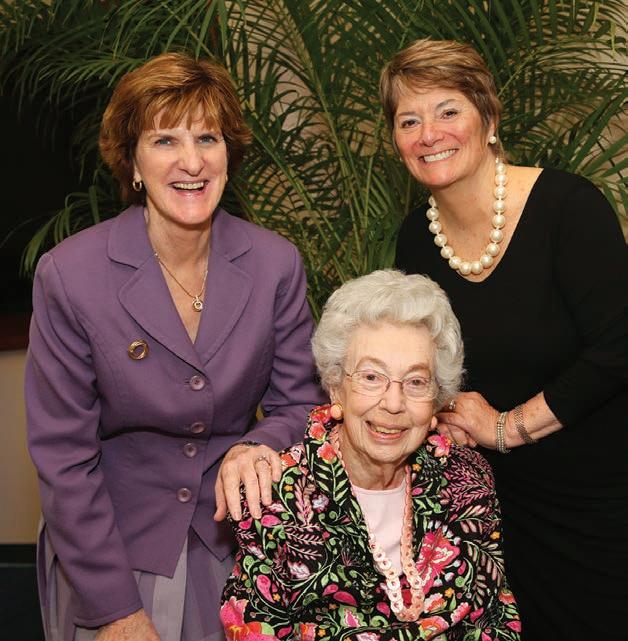

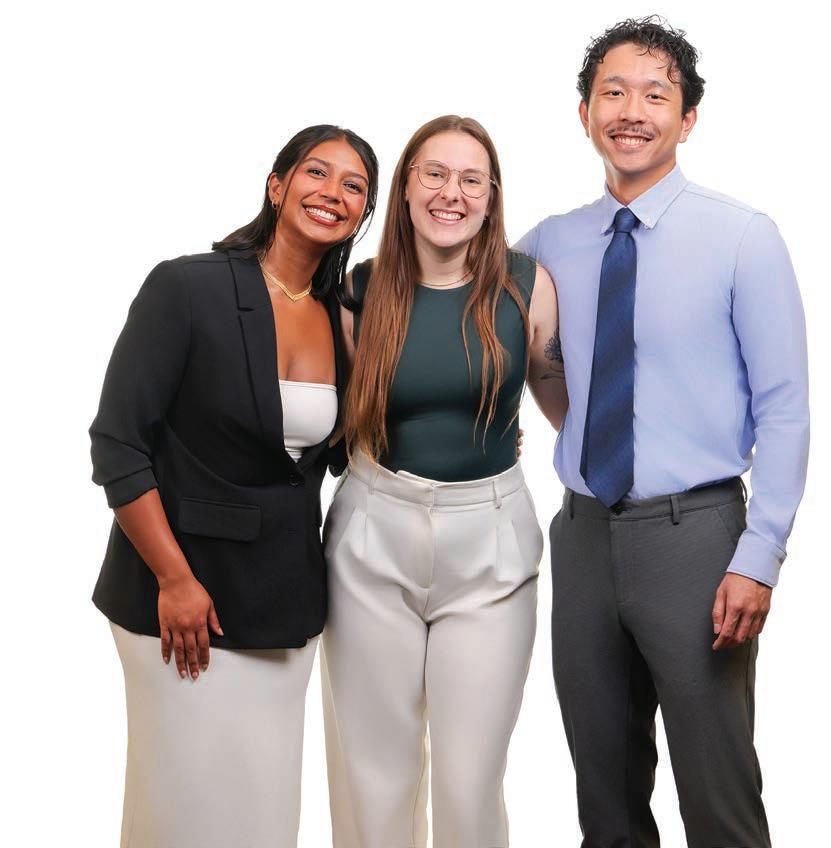
Deans Emeritae Marion Broome, Catherine Gilliss, and Ruby Wilson. Read about Ruby Wilson's special gift. (p. 22)
Rwanda's Historic DNP Milestone, as Nurses Pursue Advanced Practice at Duke
By Jessica Covil-Manset, PhD
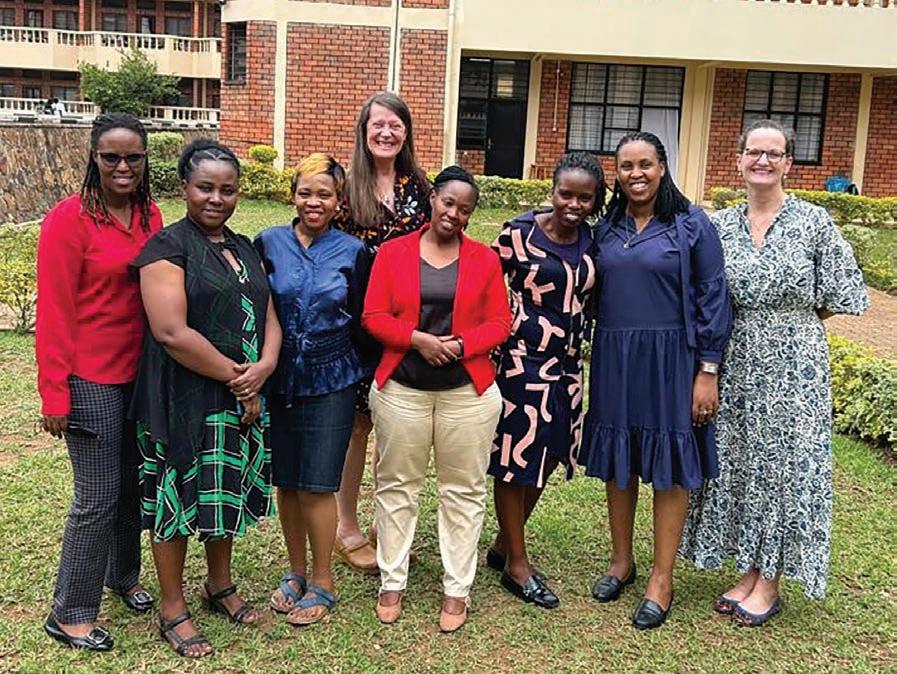
A Historic First for Rwanda—and Africa
In August 2024, six nursing professionals from the University of Rwanda matriculated into the Doctor of Nursing Practice (DNP) program at Duke University School of Nursing, beginning a journey that will have a tremendous impact not only on their individual careers, but on the continued development of healthcare and nursing education in their home country.
Rwanda has been rebuilding their healthcare system since the genocide against the Tutsi ethnic group in 1994. In hopes of improving present-day health indicators across the country, Rwanda’s Ministry of Health has encouraged professional expertise in evidence-based quality improvement, particularly in pediatric and neonatal healthcare.
“Those particular health indicators around neonatal and pediatric deaths are where the Ministry of Health sees a great need for improvement,” explained Dr. Eleanor Stevenson, Professor at the
School of Nursing and Interim Vice Dean for Global and Community Health Affairs. “And they recognize that the way to improve is to train a generation of nurses with this advanced skill set.”
To that end, the University of Rwanda has been developing their curriculum to administer a DNP program, with hopes of delivering in the next year or so. Their particular DNP program will be pediatric and neonatal focused. This marks a historic undertaking, since it is believed that their DNP program will be the first not only in Rwanda, but on the entire African continent.
Why Duke?
As Rwanda prepares for its first DNP program, Duke University School of Nursing is serving not only as a pathway to a DNP degree, but as a blueprint for what a DNP program might look like.
The six new Rwandan students, who are all master’s degree-prepared teaching faculty at their institution, visited the School of
Preparing Today’s Nurse Leaders for Tomorrow’s Global Health Challenges
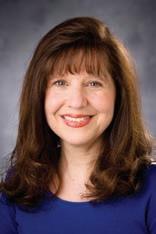
Duke University School of Nursing's Doctor of Nursing Practice (DNP) program is designed to equip nurses with the advanced skills and knowledge necessary to lead in a rapidly evolving global healthcare landscape. The program emphasizes three core hallmarks: translation, transformation, and leadership. Students learn to evaluate research credibility and use findings to inform advancements in practice, create strategies to drive organizational and individual progress through innovation, and develop leadership skills to assume pivotal roles in a wide range of specialty care.
One of the unique aspects of our DNP program is its global perspective. We collaborate with international organizations and schools to develop evidence-based practice solutions that improve patient care, reduce costs, increase productivity, and address social determinants of health. This global approach not only enhances the learning experience for students but also prepares them to address healthcare challenges on a worldwide scale. Distance-based courses, combined with on-campus sessions, provide flexibility for working professionals, allowing them to continue their education without sacrificing their careers.
Mary Lou Affronti, DNP, MHSc, RN, ANP, FAAN, is the assistant dean for the DNP program. “Through DUSON’S Office of Global and Community Health Initiatives (OGACHI) we have provided global experiences that foster DNP projects for some of our US-based DNP students. Likewise, we have provided our international DNP students and faculty colleagues with enriched US experiences,” Dr. Affronti explained. “Through these collaborations and perspectives we hope to improve healthcare quality and education both here in the United States and in our international students’ respective home countries.”
L-R: Claudine Muteteli, Delphine Mukandayisaba, Francine Nyirangorore, Anne Derouin, Ruth Dusabe, Alphonsine Umutoni Uwase, Miriam Batamuriza and Eleanor Stevenson
Mary Lou Affronti
Nursing for their first On-Campus Intensive (OCI) in October 2024, and they were accompanied by leadership from the University of Rwanda who will be overseeing their DNP program. They returned for their second OCI in February 2025.
According to Dr. Stevenson, this mutual learning experience was made possible in part due to a longstanding relationship between the University of Rwanda and Duke University School of Nursing, facilitated by Dean Michael Relf.
“Dean Michael Relf has had a relationship with the University of Rwanda for upwards of 10 years and really laid the foundation for this collaboration, which brought this particular opportunity to us and allowed us to be partners with them as they embark on the next phase of the development of their healthcare system,” said Dr. Stevenson.
Justin Wellins, MPH, who works alongside Dr. Stevenson in the School of Nursing’s Office of Global and Community Health Initiatives (OGACHI) as the Program Director of Global Health Affairs, spoke to the relationship between this particular initiative and the overall mission at OGACHI, which has championed collaborative initiatives at the local, regional, and international levels since 2006.
“Our office’s ethos is really supporting and creating larger ripples out of these smaller-impact touch points,” said Wellins. “By educating these six faculty members, who are now going to be DNP-prepared, we’ll then impact Rwanda, the region, and hopefully the continent to create more programming.”
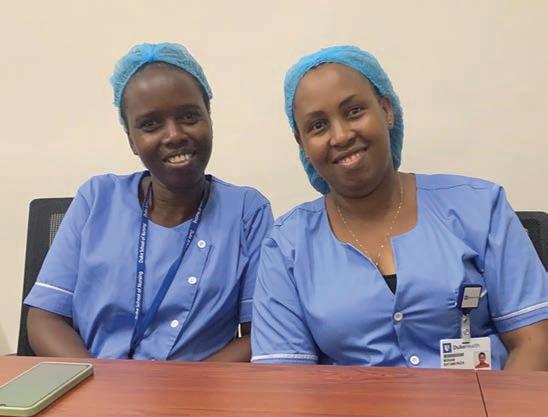
Students
detail their motivations
for pursuing a DNP at Duke University School of Nursing
“The common goal for my colleagues and I is to acquire diverse knowledge. After graduating, we will participate in and improve different areas of our health system—conducting studies, performing research, and translating evidence-based practice interventions.”
—Delphine Mukandayisaba
“The health sector in Rwanda needs those who can transform academic research into clinical interventions aimed at improving the quality of healthcare systems, health policies, and leadership. Something impressive about the DNP is that it includes a quality improvement project, so it is going to lead to positive improvement in our hospitals at the end of the day.”
—Ruth Dusabe
“I worked as a midwife before but have worked as a pediatric nurse since 2019. There is a connection between caring for the mother, the neonate, and up through pediatrics. . . And my personal passion is teaching and preparing the next generation of nurses.”
—Alphonsine Umutoni Uwase
“I really care about the child, their growth and development. I'm very interested in the younger children because I want to make timely interventions and to build a strong generation—cognitively, socially, psychologically, and physically. Completely and holistically.”
—Francine Nyirangorore
“ I am passionate about working with neonates because they are so vulnerable. When they are sick, they need help. They need care and the opportunity to grow.”
—Claudine Muteteli
“I grew up in a community where children and women are marginalized socially and culturally. I knew that whatever I did in my career, I wanted to support and empower women and children. I have come to realize that the DNP is what I need to be an expert in terms of clinical practice and to get the leadership skills to be a positive change agent in my country.”
—Miriam Batamuriza
A Snapshot of the Students
According to the Fifth Rwanda Population and Housing Census, conducted in 2022, 50% of Rwanda’s population is under 20 years old, and the overall mean age is 22.7 years old. In keeping with the Rwandan Ministry of Health’s desire to improve health indicators for its young population, three of the DNP students from Rwanda are pediatric-focused, while the other three specialize in neonatal care.
Mutual benefit and humility are among the values that OGACHI emphasizes, affirming in their values statement that the work they do is “intended to be sustainable with a non-paternalistic, non-ethnocentric approach where the strengths, talents, and resources of both partners are optimized.”
Participating alongside their peers in OCIs, as well as leading their own qualitative improvement projects (QIPs), the six Rwandan faculty members pursuing their DNP are likewise leaving their footprints on nursing innovation and education here at Duke.
Part of what brings this group of students together is a shared desire to shape the future of Rwanda, especially as children of the 1994 genocide. By acquiring the advanced knowledge and skills that make up the DNP at Duke University, they can apply what they learn as they pioneer the first DNP program in Rwanda and in Africa. In doing so, they aim to collaborate with leaders from various settings to prepare and implement quality improvement projects in support of a healthy and well-prepared next generation.
Alphonsine Umutoni Uwase and Miriam Batamuriza, DUSON DNP students and faculty at University of Rwanda
By Jessica Covil-Manset, PhD
Innovations in Nursing: Faculty Research and Community Impact HANZHANG XU MITCHELL KNISELY
DEMYSTIFYING DEMENTIA AMONG AGING CHINESE IMMIGRANTS

From March 2022 to February 2025, School of Nursing
Associate Professor Hanzhang Xu, PhD’18, RN, FAAN, conducted the NIH-funded study, “Developing a Mobile AppBased Intervention to Promote Cognitive Health in Older Chinese Americans,” to make cognitive training more linguistically and culturally relevant through the development of a mobile application.
A research expert in dementia care, Dr. Xu’s study set out to address the particular needs of Chinese Americans, 70% of whom are first-generation immigrants, with nearly 20% living below the poverty line. Given that close to half of this population has limited English proficiency, many standard cognitive health assessments and informational materials are rendered inaccessible or ineffective.
Dr. Xu also said that, despite some stigma around the word “dementia,” this community demonstrates a strong interest in maintaining cognitive health, with some striving to learn English not for acculturation purposes, but as a way to exercise the brain. According to Dr. Xu, many also turn to the WeChat app chat groups for advice and strategies, signaling both a need and a desire for more medically sound sources of information that are also mobile-accessible.
“I want to demystify the concept of dementia and Alzheimer’s disease, and to present the most updated scientific information about dementia, care, and treatment to the community in a way that they can understand,” said Dr. Xu.
Over the last two years especially, Dr. Xu has ramped up her community outreach efforts, partnering with Chinese American cultural institutions like the Chinese-American Friendship Association of North Carolina (CAFA) and the Cary Senior Center to lead workshops and seminars. Dr. Xu said that local Chinese schools have also provided a platform to reach the adult children of (and potential caregivers for) aging Chinese Americans.
Dr. Xu is especially attentive to the family dynamics of Chinese Americans, who sometimes have varying expectations for “filial piety.” She explained that, while in China it is the norm to care for one’s parents or elders, this cultural value is less prominent in the United States and among immigrants who have lived here for some time.
As the daughter of aging Chinese immigrants, Dr. Xu feels both a personal and professional calling to care for aging adults, especially those who belong to ethnically minoritized populations.
“That’s really my motivation — to use my professional training and work towards providing culturally sensitive care for different populations and families facing this condition,” said Dr. Xu.
TACKLING THE INEQUITIES OF CHRONIC PAIN THROUGH ACUPUNCTURE AND GUIDED MEDITATION
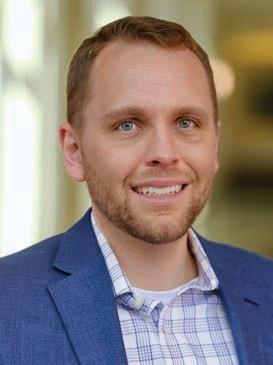
Mitchell Knisely, PhD, RN, ACNSBC, PMGT-BC, FAAN, is an Associate Professor at Duke University School of Nursing specializing in chronic pain. He works to provide pain management options for populations that face barriers to access due to systemic factors.
Dr. Knisely spearheaded the GAIN (Group Acupuncture for Pain Relief in Rural Communities) Study, bringing acupuncture to rural communities which are impacted by high rates of chronic pain and the ongoing opioid epidemic and therefore in need of non-pharmacological alternatives.
Funded by the Betty Irene Moore Fellowship for Nurse Leaders and Innovators, and working in partnership with the Mebane (NC) Historical Museum, the GAIN Study seeks to evaluate the feasibility of delivering acupuncture in group settings, which offers a potential scalable and sustainable model for delivering acupuncture to treat chronic pain to more people.
In a second study, which began in 2020 and is funded by a National Institutes of Health (NIH) grant, Dr. Knisely and his team are running a clinical research trial to test both acupuncture and guided relaxation as methods of pain management for people living with sickle cell disease.
“We’re working with University of Illinois Chicago, University of Florida, Johns Hopkins University, and Emory University, recruiting 366 individuals to test acupuncture and guided relaxation in different combinations or sequences,” said Dr. Knisely. “This is the first study of its kind and of this scale for patients with sickle cell disease who experience chronic pain.”
Sickle cell is an inherited disease, and in the United States it predominantly impacts people who are Black or African American. More than 50% of adults with sickle cell disease experience chronic pain.
Dr. Knisely and his team made several adjustments to better accommodate study participants, including offering sites in Greensboro, Durham, and Raleigh and providing bus fare. They laid out many of their methods in an article for the Journal of Integrative and Complementary Medicine, “Developing an Implementation Blueprint for the NIH HEAL Initiative GRACE Trial: Perspectives on Acupuncture and Guided Relaxation for Chronic Sickle Cell Disease Pain.”
Dr. Knisely also served on the Board of Directors for the American Society of Pain Management Nursing. Dr. Knisely was the lead author on “Disparities, Inequities, and Injustices in Populations with Pain: An ASPMN Position Statement” and a senior author on “Disparities, Inequities, and Injustices in Populations with Pain: Nursing Recommendations Supporting ASPMN’s 2024 Position Statement.”
“We wanted to not only make a statement that these inequities exist, but to also offer ways that we as practicing nurses, leaders and researchers can begin to address them,” said Dr. Knisely. “I think we’ve made some strides, but we still have a long way to go.”
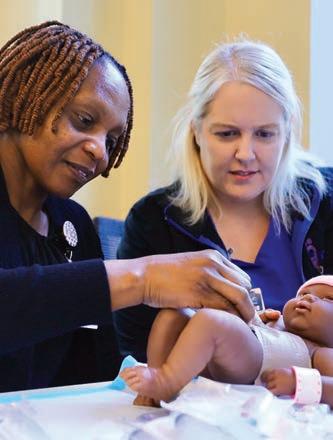
The School's Center for Nursing Discovery has worked to integrate SDOH into simulations that cover the lifespan of potential patients.
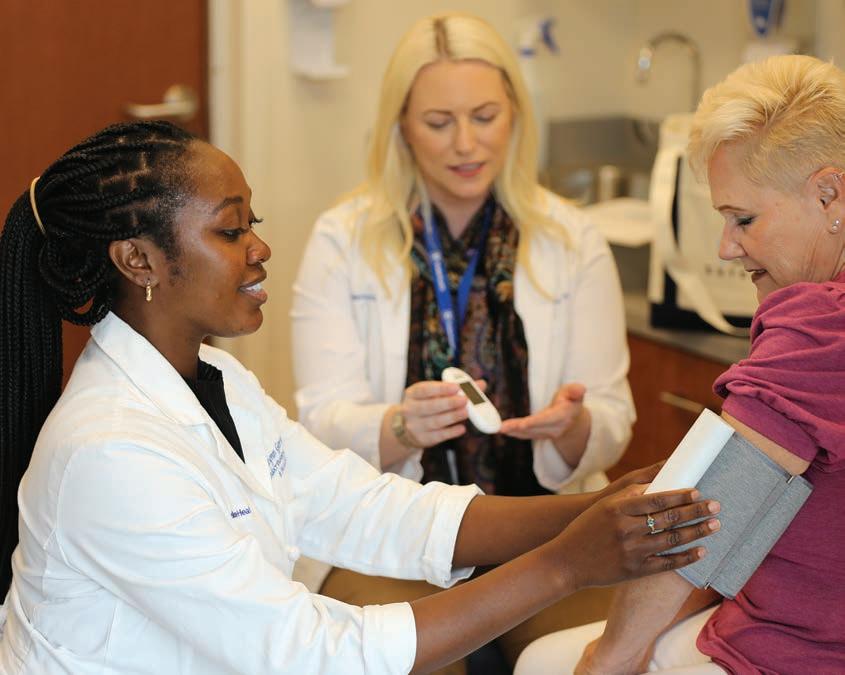
Promoting Patient Representation in Simulation-Based Nursing Education
By Jessica Covil-Manset, PhD
Over the past several years, Duke University School of Nursing—committed to our mission to support health equity and social justice—has devoted increased attention to introducing social determinants of health (SDOH) into our simulation lab activities.
Nikki Blodgett, PhD, RN, CHSE, Associate Professor at the School and Director of the Center for Nursing Discovery (CND), said that this push was motivated in part by updated visions for the nursing field, as outlined in The Future of Nursing 2020-2030: Charting a Path to Achieve Health Equity, a 2021 publication by the National Academies of Sciences, Engineering, and Medicine, as well as the American Association of Colleges of Nursing’s updated Essentials: Core Competencies for Professional Nursing Education. Both emphasized the role that nurses play in addressing systemic inequities and promoting better health outcomes through an awareness of social determinants of health.
Dr. Blodgett also said that societal factors, felt more acutely in the COVID-19 pandemic, played a role. She cited the protests regarding police brutality and racial bias, emphasizing a shared institutional desire to increase efforts around diversity, equity, and inclusion, especially in simulation (SIM) lab activities.
"The Center for Nursing Discovery manages about 5,000 student encounters a semester, or 15,000 student encounters a year,” said Dr. Blodgett. “Over the course of these last several years, we've done an audit of all of our SIMs and all of our teaching plans to make sure that we're removing potential biases or stereotypes for our simulations across the curriculum.” Encounters are defined as student interactions with SIMs.
“The lab content is created on the CND side, and it is with thoughtfulness and partnership with the classroom and the clinical setting to make sure that our education is continuous,” added Heather Lachiewicz, MSN, RN, CNML, NE-BC, NPD-BC, CHSE, CNE, Clinical Nurse Educator/Clinical Associate at the School.
The School has since obtained simulation supplies that are more representative of diverse patients, including mannequins with darker skin tones and with aged skin.
The SIMs may also use standardized patients, who are real actors, to portray a variety of patient circumstances—such as a transgender patient receiving care, a gay couple facing end of life, or an interfaith couple navigating spiritual differences in their healthcare.
“We are teaching these nurses to look at diversity, and diversity is more than one aspect,” said Lachiewicz.
Blodgett and Lachiewicz both said that students have shared positive feedback in simulation debriefings and evaluations, stating that they are glad for the opportunity to discuss various issues, like gender and race, in clear and deliberate ways and with a sense of curiosity. They were also appreciative of having end-of-life experience in SIMs before encountering a death for the first time in hospital.
“We’re preparing students to be leaders of the future,” said Dr. Blodgett. “And how we portray things really makes a difference and sets the stage for what we expect the learner to do in clinical.”
Innovations in Nursing: Faculty Research and Community Impact
By Jessica Covil-Manset, PhD








Building Relationships and Making an M-PACT with Rural Pamlico County
In July 2022, the Community Health Improvement Partnership Program (D-CHIPP) at Duke University School of Nursing began a four-year, HRSAfunded cooperative agreement to support a nurse-led mobile health unit that would service rural and underserved urban populations. Now nearly three years in, the Mobile Prevention and Care Team (M-PACT) Clinic has made strides in providing professional development training, granting scholarships to nursing students to complete M-PACT courses and clinic work, and sending a nurse practitioner into local communities to provide clinical care.
According to Donna Biederman, DrPH, MN, RN, CPH, FAAN, the creator and project director of M-PACT, the program has built a particularly strong relationship with Pamlico County.
M-PACT has recently signed a Clinical Services Agreement with Pamlico County, which enables a nurse practitioner to conduct telemedicine visits to expand Pamlico County Health Department’s capacity to offer primary care.


“Our nurse practitioner will be doing telemedicine there on Monday, and master’s students will be able to join and learn how it is done,” said Dr. Biederman. "It was a heavy lift, but I think it's going to really pay off."
Moreover, M-PACT Scholars and CIs have undergone a number of weeklong immersion experiences in Pamlico County filled with health-related activities. So far, there have been four cohorts of M-PACT Scholars, made up of a varying mix of prelicensure and master’s students.
M-PACT Scholars have also performed vision and hearing screenings in Pamlico County, supporting under-resourced public schools so that students can benefit from early interventions. Additionally, M-PACT partners with an ophthalmologist to provide glasses free of charge.
“The last time we were in Pamlico, there were 12 to 15 students who screened positive and needed an advanced vision test, and then they were able to get the glasses they needed as a result of our efforts,” said Heather Mountz, a program coordinator for D-CHIPP who provides project support for M-PACT.
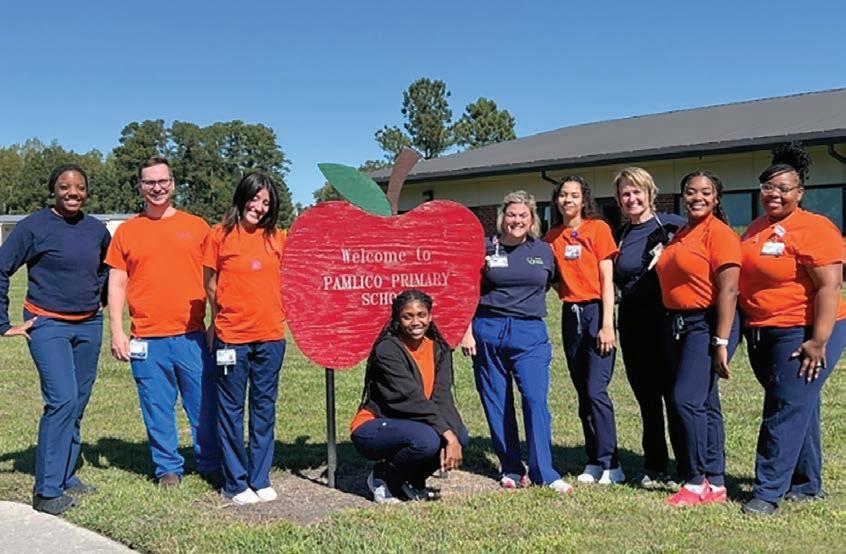
Both Mountz and Dr. Biederman emphasized the impact that the program has had on students, who have reflected positively on the clinical experience they have gained, the opportunities to support underserved communities, and the significance for their future careers.
“As one example, a former Scholar of ours was accepted into a DNP program in South Carolina, and he wanted to establish something similar to M-PACT and develop a model of nursing care,” said Dr. Biederman. "Just to see students want to continue the work in a different capacity or a different place is pretty amazing.”
M-PACT is funded by a HRSA cooperative agreement UK1HP46054.
M-PACT scholars in Pamlico County, NC
Speaking the Language of Care
By Matt Lardie
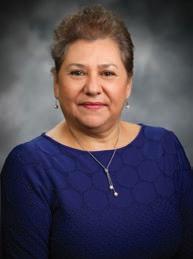
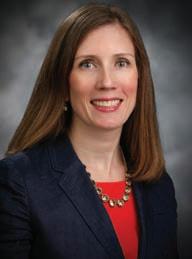
Compassionate, competent healthcare relies on communication, and it is not uncommon for a nurse to encounter language barriers when caring for a patient. Today many healthcare systems have translators on staff or on call, and the rise of translation apps means many nurses have access to a plethora of languages right on their phones. However, no amount of translation can replace the personal connection that comes when a nurse is able to sit down and speak to their patient in that patient’s native language.
Two classes at DUSON aim to support those one-on-one connections—Dr. Rosa Solorzano’s Medical Spanish and Cultural Competency in Healthcare class and Dr. Amie Koch’s inaugural American Sign Language for Healthcare Professionals class.
“The inequity in care that I have seen and read about led me to want to expose more nursing students to basic ASL,” Dr. Koch explained. “Many Deaf people have difficulty accessing and receiving healthcare due to communication barriers, which can lead to poor health outcomes.”
Dr. Solorzano agreed and noted, “To fully align with our school's mission, vision, and values of advocating for health equity, social justice, and improving patient outcomes, we must prepare our students to meet the needs of our diverse population. One crucial way to achieve this is by learning medical Spanish.”
Drs. Solorzano and Koch both connected their desire to prepare students for culturally competent care to personal experiences they’ve had both as patients and as providers. “When I was a new immigrant in the USA, I experienced a serious health issue during my second pregnancy,” Dr. Solorzano recalled. “I felt debilitated and very vulnerable. My encounter with the healthcare provider was less than optimal; I didn't feel understood or respected. Once I regained my strength, I reflected on my experience. If I, who could understand the language and had medical knowledge, felt so miserable, I couldn't imagine how the women I worked with, who didn't speak English or understand their health problems, would feel in such vulnerable moments.”
Dr. Koch, who has spent time working with patients at Lincoln Community Health Center in Durham, said, “As a healthcare provider, I see a difference in patient-healthcare team interaction when the healthcare team members are able to show they are a safe, culturally sensitive, and empathetic people to interact with. This can be done when trying to use some of the individual’s native language.”
She continued, “Even if the nurse is not doing perfectly, it shows that the nurse is trying to connect with the individual, and hopefully make the healthcare experience a little less scary or frustrating.”
Marieli Roman, ABSN'25, enrolled in Solorzano's class. “I was inspired to sign up for the medical Spanish class because I recognized the growing need for bilingual healthcare professionals,” she said. “Growing up, Spanish was my first language, and I often had to translate for my mother during medical appointments. This experience made me realize how crucial it is for non-English-speaking patients to have access to professionals who can help them with health literacy. I also saw this class as an opportunity to expand my medical vocabulary in Spanish, ensuring I can communicate effectively and provide the best possible care to Spanish-speaking patients.”
Students in both classes practice their language skills on each other and in simulations, such as caring for a pregnant person


whose native language is Spanish. Some students have already seen the real-world benefits of this language training. Harper Hornaday, ABSN’24, took both the Medical Spanish and ASL classes and has found them useful in his post-graduate position as an RN at UNC Health’s Youth Behavioral Hospital in Butner, NC.
“I recently was able to conduct an assessment of a patient in Spanish and I learned things that I believe I would not have otherwise learned,” Hornaday said. “Being able to communicate with a patient in their native language builds rapport and trust, making it easier for me as a nurse to do my job and provide the best care possible.”
Rosa Solorzano Amie Koch
2024 SCHOOL OF NURSING TAILGATE
On September 28th alumni, students, faculty, and staff donned their Duke blue (and custom DUSON referee jerseys) and gathered outside of Wallace Wade Stadium for tailgating festivities before the Homecoming Weekend matchup against UNC. All that good energy and cheer must have helped because the Blue Devils went on to defeat the Tar Heels 21 to 20. Keep an eye out for an invitation to another tailgating event this fall!
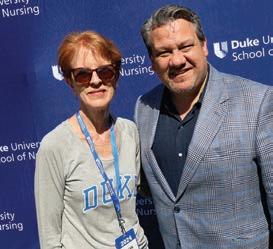
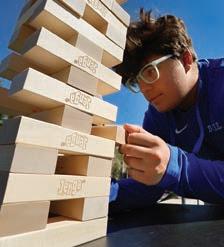
2025 TAILGATE
Coming Soon on September 20!
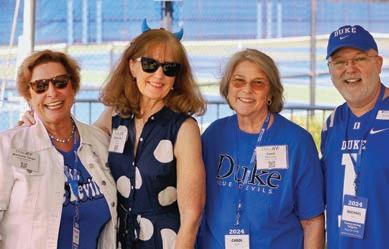
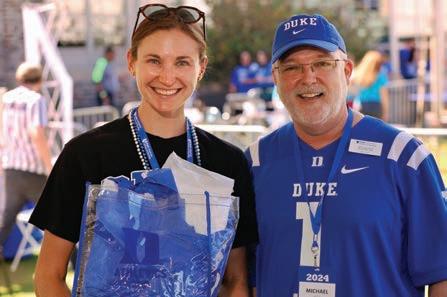
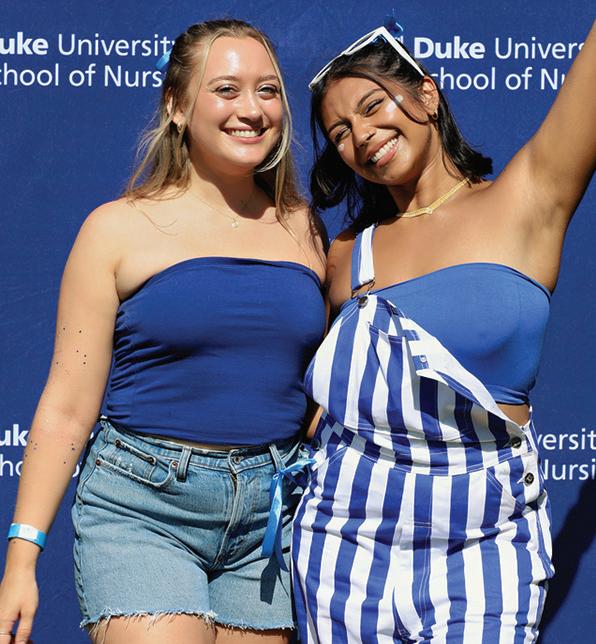
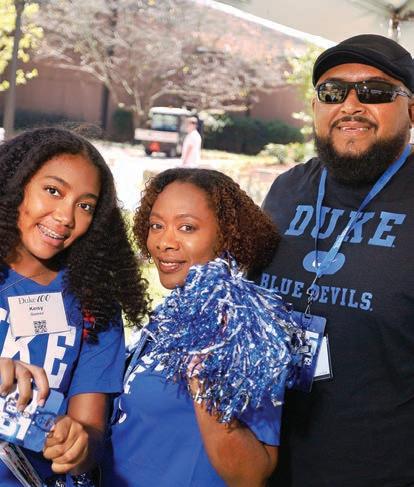
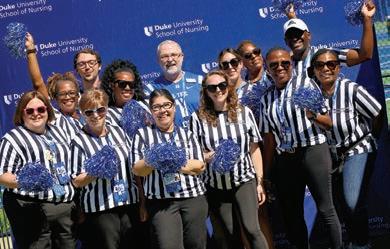
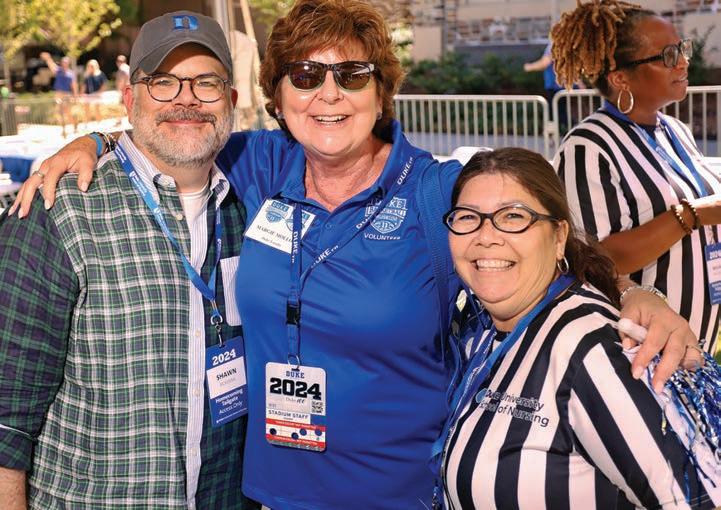
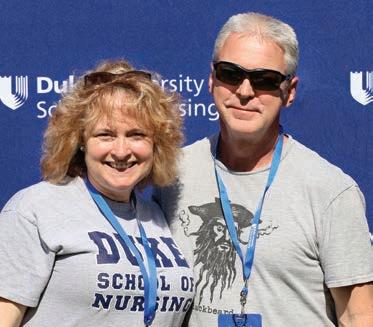
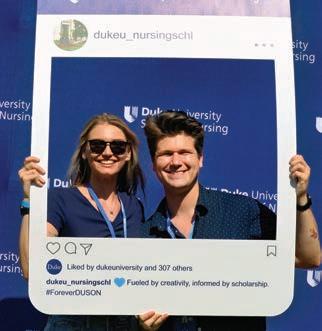
School of Nursing Welcomes New Leaders
Angie Keith VICE DEAN FOR FINANCE AND ADM INISTRATION
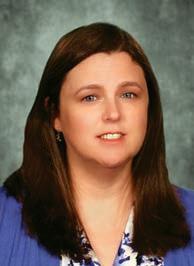
Angie Keith, MBA, serves as the Chief Financial and Administrative Officer within the School, providing oversight to the finance, budgeting, human resources, facility management, information technology, and space planning functions. She also serves as a member of the Dean’s senior leadership group and represents the School within the Duke University Health System, on campus, and to the outside community.
Keith served in this role on an interim basis for eight months since the transition of Dave Bowersox to the Provost’s office in March. She has been a vital part of DUSON since she joined the school in 2003. Over her more than 20 years with DUSON, she has played a key role in our finance and administration team. Keith has successfully implemented budget management strategies, ensuring efficient resource allocation. She has led cross-functional teams in cost-saving initiatives, managed HR-related changes, and optimized administrative workflows to boost overall efficiency.
Kate Gray
ASSOCIATE DEAN FOR DEVELOPMENT AND ALUMNI AFFAIRS
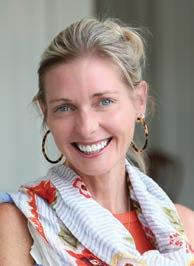
Kate Gray, MPA, joined DUSON last December as the School’s new Associate Dean for Development and Alumni Affairs. Gray is a seasoned fundraising and communications professional with over 15 years of experience in securing significant gifts for leading university systems and healthcare organizations.
She manages a portfolio of DUSON’s top prospects and donors, provides oversight of the school’s two volunteer boards, and engages faculty and staff meaningfully in the overall advancement effort. She serves as a member of the Dean’s senior leadership group and coordinates closely with leaders from Duke Health and Duke University Development and Alumni Affairs. Prior to coming to DUSON, Gray most recently served as the Senior Director of Development at the University of North Carolina-Chapel Hill School of Nursing, where she spearheaded the framework for a $94 million building campaign, secured the five largest gifts from individuals to Carolina Nursing in the school’s history, and with her team raised $40 million for the recent Campaign for Carolina.
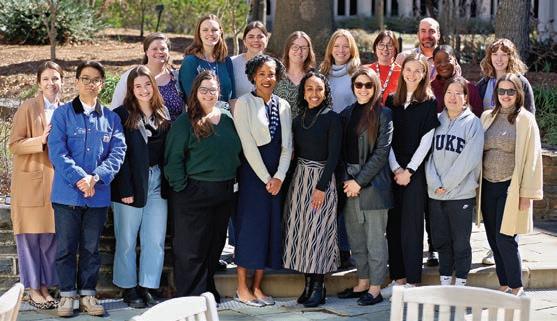
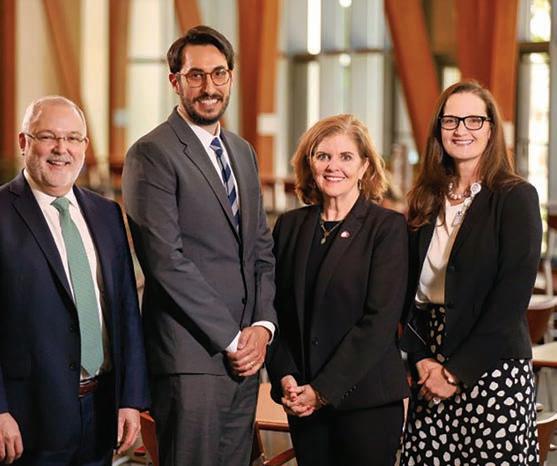
Healthcare Leaders for Spring Lectures
This spring the DUSON community hosted a series of lectures by some of the nation’s foremost nurse leaders. The 2025 Harriet Cook Carter Lecture featured Monica Rose McLemore, PhD, MPH, RN, for a talk titled, “Understanding Health Equity in Context of 2025,” while the 14th Annual Global Health Lecture hosted Sheila Davis, DNP, ANP-BC, FAAN, CEO of Partners in Health, who addressed current issues facing global health work.
Top Photo: Dr. Monica McLemore poses with DUSON PhD students during her visit to campus. Bottom Photo, L-R: Dean Michael Relf, Justin Wellins, Sheila Davis, and Eleanor Stevenson.
DUSON Faculty and Staff Receive University Fellowships for AY 24/25
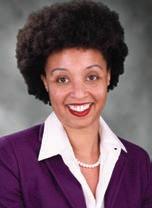
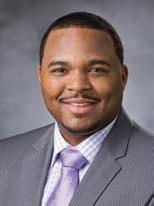
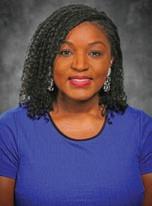
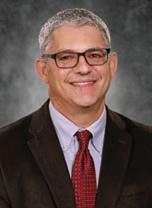
Jacquelyn “Jacqui” M. McMillianBohler, PhD, CNM, CNE, Assistant Clinical Professor and Associate Dean for Academic Innovation and Evaluation, is one of six Duke scholars selected for a Duke Ivy+ Provost Leadership Fellowship. As a fellow, she will participate in the “Institute on Inquiry, Equity and Leadership in the Academic Department” organized by the Ivy+ Faculty Advancement Network, alongside peers from a dozen other universities. The Duke cohort will pursue ideas that advance the university’s commitment to inclusive excellence and directly benefit their own departments and disciplines.
Michael P. Cary, PhD, RN, FAAN, Associate Professor, has been selected for the inaugural cohort of eight faculty members from diverse fields who will join the Duke Faculty Academy.
Organized by the Office for Faculty Advancement with key university partners, the Duke Faculty Academy is designed to help participants develop creative solutions to issues that impact the faculty experience. The cohort’s focus will be on creating innovative projects relating to generative AI and the faculty experience.
Bernice Alston, PhD, director of Student Success, was appointed a 2024 Scholar of the Duke Leadership Academy. The program offers emerging leaders from across the university the opportunity to participate in a unique 12-month development initiative.
Benjamin Smallheer, PhD, ACNP-BC, FNP-BC, CCRN, CNE, FAANP, Associate Clinical Professor and Assistant Dean for the Master of Science in Nursing Program, has been selected as one of three inaugural Provost Faculty Fellows. The Provost Faculty Fellows Program aims to introduce Duke faculty members to key leadership roles and responsibilities and areas of strategic focus of the University.


CRNA Event Encourages Diverse Nurse Anesthetist Population
This past September DUSON hosted a Diversity CRNA summit, a day-long event where dozens of aspiring nurse anesthetists heard from campus and industry leaders, learned about the admissions process, participated in simulations, and had the chance to network with colleagues. The event was emceed by DUSON CRNA graduate Dr. Tedrick Vernon.
Faculty Receive Duke Appointments
DUSON had faculty members appointed to all three committees charged by Provost Alec D. Gallimore with improving teaching and supporting innovative academic structures. The committees — collectively referred to as the 2030 Teaching Excellence & Innovation Initiative — seek to enable excellent teaching and mentoring at Duke while embracing more adaptable structures that will allow the university to meet the evolving needs of its undergraduate and graduate student body.
Rosa Gonzalez-Guarda Teaching & Mentoring Excellence Committee
Jacqui McMillian-Bohler Cross-School Teaching Committee
Jennie DeGagne
Adaptable Academic Structures Committee
Jacquelyn "Jacqui" M. McMillan-Bohler
Michael Cary
Benjamin Smallheer
Bernice Alston
DUSON Faculty Named Fellows in N-SISS Program
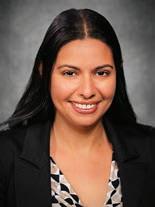
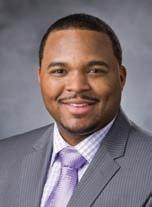
Dr. Marissa Abram and Dr. Michael Cary were selected to be among the first 10 fellows of the Nursing Science Incubator for Social Determinants of Health Solutions (N-SISS).
N-SISS is a program of the Institute for Policy Solutions (IPS) at Johns Hopkins School of Nursing (JHSON) with support from the National Institute of Nursing Research (NINR).
Faculty Awards and Recognitions
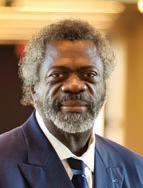
2024 NLN
President’s Award
DR. ERNEST J. GRANT
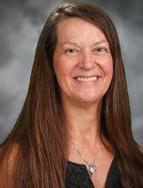
NC Association of Pediatric Nurse Practitioners 2024
Marcia Lorimer Legacy Award
DR. ANNE L. DEROUIN
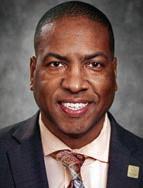
U.S. Army Medical Department 9A Proficiency Designator Award
DR. DERRICK GLYMPH
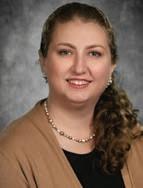
Penn Nursing Early Career Award for Excellence
Elizabeth C. Clipp Term Chair of Nursing
DR. DARINA V. PETROVSKY
Top Marks in NLN Designations
Faculty Fellowships in Professional Societies
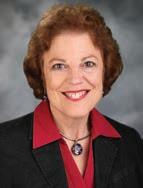
Fellow, Association of Oncology Social Work (AOSW)
DR. SOPHIA K. SMITH

Fellow, Academy of Diversity Leaders in Nursing (ADLN)
DR. ERNEST J. GRANT
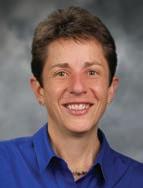
Fellow, Society of Critical Care Medicine (SCCM)
DR. REMI M. HUECKEL
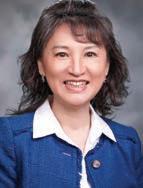
Ewha Global Fellow
DR. JENNIE DE GAGNE
D-CHIPP Announces 2025 Community Grants
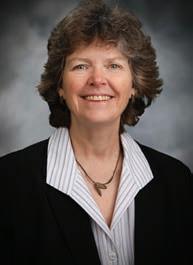
DukeUniversity
School of Nursing Community Health Improvement Partnerships Program (D-CHIPP) continues to build on its record of
success in partnering with organizations and local governments across North Carolina to address critical health needs and gaps in services as well as engaging in community health relation coalitions. The program, led by Dr. Donna Biederman, recently announced a new slate of community partner grants.
The grants, totaling $25,000, went to Church World Service, TROSA, Durham TRY, the Pamlico County Health Department, Families Moving Forward, and Project Access of Durham County. The grants will support specific priorities of each organization, such as improving the gynecology experience of TROSA residents with improved clinic flow and standardized equipment, or testing the feasibility of training Church World Service refugee clients as Community Health Ambassadors.
Duke University School of Nursing has been re-designated as a 2024 National League for Nursing (NLN) Center of Excellence (COE)—making Duke University/Duke Health once again the only institution to have received all four current designations. This year, the School of Nursing received recognition in the category of “Creating environments that enhance student learning and professional development.” The School of Nursing joined other nursing education programs, leading teaching hospitals, and clinical sites in being honored at the 2024 NLN Education Summit Honors Convocation last fall.
“Our partners play a critical role in advancing community health,” said Dr. Biederman. “They offer a unique environment for DUSON students within each of our nursing programs. Some of our faculty and staff have worked with these partners for years, if not decades. Our community partners are content experts and have provided a means to advance our scholarship and educational mission.”
Marissa Abram Michael Cary
Donna Beiderman
Knisely Appointed Assistant Dean,
PhD & Post-Doctoral
Programs

Mitchell R. Knisely, PhD, RN, ACNS-BC, PMGT-BC, FAAN, has been appointed Assistant Dean of the PhD and post-doctoral programs at DUSON, effective July 1, 2025. Dr. Knisely’s research focuses on advancing equitable pain care for individuals with sickle cell disease and other chronic pain conditions. Dr. Knisely is board certified as an Adult Health Clinical Nurse Specialist and in pain management nursing. After earning his BSN from Purdue University and his MSN and PhD from Indiana University, he completed a postdoctoral fellowship in genomics at the University of Pittsburgh School of Nursing and trained at NIH's National Institute of Nursing Research Summer Genetics Institute. Dr. Knisely is a Fellow in both the Betty Irene Moore Fellowship for Nurse Leaders & Innovators and the American Academy of Nursing. He serves on the editorial board for Pain Management Nursing and is also actively involved in the American Society for Pain Management Nursing, the United States Association for the Study of Pain, and the International Association for the Study of Pain.
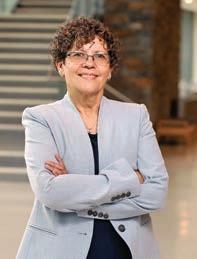
Padilla Takes On New Role with DUHS
Blanca “Iris” Padilla, PhD, MBA, MSN, APRN, FNP-BC, FAANP has been appointed the Chief Nursing Strategic Business Operations Officer (CNSBOO) at Duke University Health System. In this new role, Dr. Padilla will be pivotal in shaping the strategic direction of nursing services, ensuring alignment with economic, financial, and business objectives and driving innovation in transforming models of patient care, workforce management, and financial sustainability.

DUSON Celebrates First Class of NCCU Summer Research Fellows
Last year the School of Nursing initiated an eight-week summer fellowship for five undergraduate nursing students from North Carolina Central University (NCCU). The program, which paired the undergraduates with DUSON PhD students and post-doctoral fellows in an effort to inspire future nurses toward nursing science research careers and promote workforce diversity, was supported with assistance from the Dean's Strategic Fund and connected to the School's ongoing partnership with NCCU through the T32 Nurse-LEADS grant from NIH. Both mentees and mentors presented on the program and the group’s various research projects during a celebration at NCCU this past January.
JaLynn Biddy was one of the inaugural NCCU fellows. During her fellowship she researched attitudes, barriers, and beliefs of Black men aged 18-24 on opioid use treatments, and reflected on why she initially thought a PhD wasn’t for her. “I realized there weren’t a whole lot of nurse scientists who looked like me,” Biddy explained.
Shewit Jaynes, PhD'25, MSPH, RN, served as a mentor and presented on the outcomes of the inaugural program. “The most rewarding part of the Duke-NCCU pilot summer fellowship program was witnessing my mentee’s growing interest in nursing science, particularly her commitment to addressing maternal health inequities,” Jayne recalled. “During our weekly meetings, we delved into articles I assigned her to read, and she often asked for additional readings on topics and theories that interested her. My mentee is now working as a labor and delivery nurse, and I am confident that whether it's at the bedside or conducting research, she will be championing Black maternal health.”
"My mentee is now working as a labor and delivery nurse, and I am confident that whether it's at the bedside or conducting research, she will be championing Black maternal health." — SHEWITT JAYNES
Blanca "Iris" Padilla
Mitchell Knisely
2025 Rankings
QS WORLD UNIVERSITY RANKINGS lists Duke University School of Nursing as the #7 nursing school in the world in their 2025 index. In 2024 the school was ranked #14. The index ranks more than 200 schools of nursing across the globe.
DUSON Top Ranked in U.S. News & World Report Graduate Rankings
The School ranked #2 in the nation for 2025 Best Nursing Schools: Doctor of Nursing Practice. The School continues to lead when it comes to training doctoral-prepared nurse leaders, with top rankings for the following specialties:
#1 Best DNP Family Nurse Practitioner Programs
#1 Best DNP Leadership Programs
#3 Best DNP Gerontology, Acute Care Programs (tied)
#1 Best DNP Gerontology, Primary Care Programs
#1 Best DNP Nurse Practitioner: Pediatric, Primary Care Programs
#1 Best DNP Nurse Practitioner: Psychiatric / Mental Health, Across the Lifespan
#7 Best Nursing-Anesthesia (CRNA) Schools
Overall the School was ranked #5 for 2025 Best Nursing Schools: Master's, reflecting a deep commitment to master’s level education in a variety of specialties. The School is ranked #1 in the following programs:
#1 Best Acute Care Nurse Practitioner Programs
#1 Best Adult Primary Care Nurse Practitioner Programs
#1 Best Family Nurse Practitioner Programs
#1 Best Psychiatric Nurse Practitioner Programs
#1 Best Master's Nursing Administration Programs
#1 Best Master's Nursing Practitioner: Pediatric Primary Care Programs
DUSON Top-Ranked
in U.S. News & World Report Online Rankings
The school’s MSN programs have ranked #1 across several categories, reflecting a commitment to providing high-quality education and training tomorrow’s nurse leaders.
The School has been recognized as follows:
#3 overall rank – Best Online Master’s Nursing Programs
#1 Best Online Family Nurse Practitioner Master’s Programs
#1 Best Online Master’s in Nursing Administration/Leadership Programs
#1 Best Online Master’s in Nursing Education Programs
#1 Nurse Practitioner, Psychiatric Mental Health, Across the Lifespan
#3 Best Online Master’s in Nursing Programs for Veterans
Duke University School of Nursing once again retains top rankings across graduate nursing programs. The School continues to lead across master’s and doctoral categories, and the CRNA degree remains among the top ten in the nation.
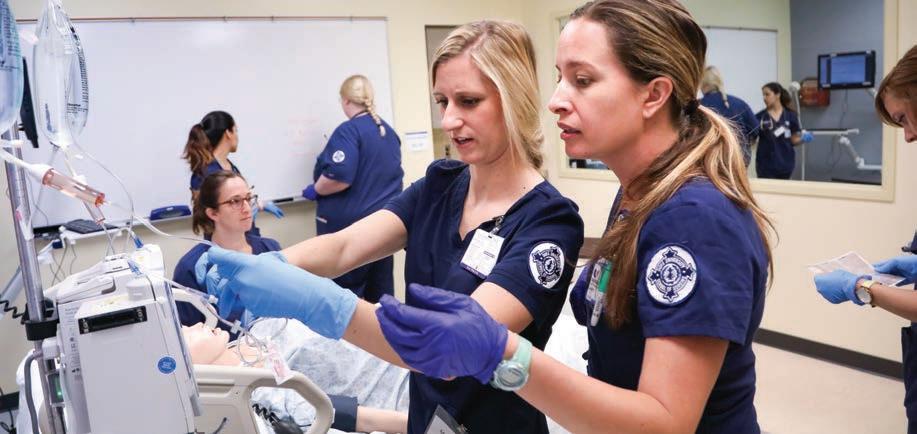

PROMOTIONS& TRANSITIONS
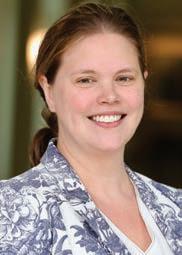
Bonnie Hepler
APPOINTED ASSISTANT PROFESSOR
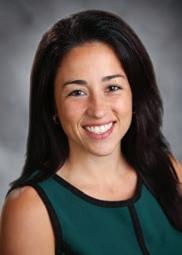
Rosa Gonzalez-Guarda
PROMOTED TO PROFESSOR WITH TENURE
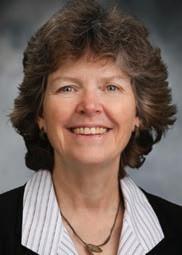
Donna Biederman
PROMOTED TO CLINICAL PROFESSOR
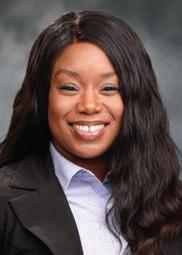
Tolulope Oyesanya
PROMOTED TO ASSOCIATE PROFESSOR WITH TENURE
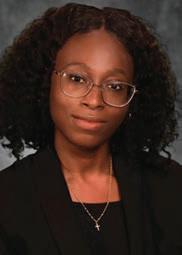
Ayomide Bankole APPOINTED ASSISTANT PROFESSOR
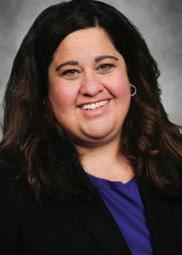
Nicole Petsas Blodgett
PROMOTED TO ASSOCIATE CLINICAL PROFESSOR
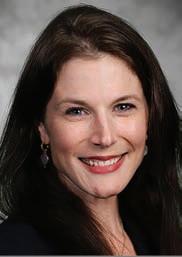
Kathryn E. Kreider
PROMOTED TO CLINICAL PROFESSOR
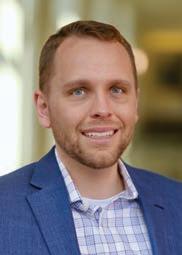
Mitch Knisely
PROMOTED TO ASSOCIATE PROFESSOR WITH TENURE
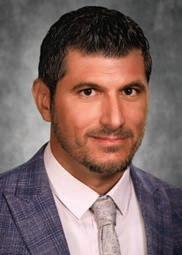
Khaled Bader
APPOINTED ASSISTANT CLINICAL PROFESSOR
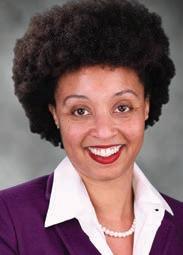
Jacquelyn McMillian-Bohler
PROMOTED TO ASSOCIATE CLINICAL PROFESSOR\
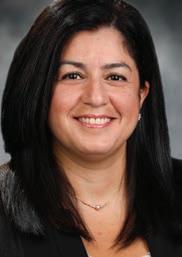
Mariam Kayle
PROMOTED TO ASSOCIATE PROFESSOR
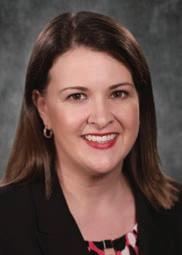
Casey Brown APPOINTED ASSISTANT CLINICAL PROFESSOR
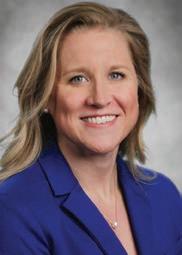
Carolina Tennyson
PROMOTED TO ASSOCIATE CLINICAL PROFESSOR
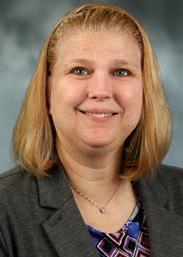
Sharron Rushton
PROMOTED TO ASSOCIATE CLINICAL PROFESSOR

Christina Leonard
PROMOTED TO ASSOCIATE CLINICAL PROFESSOR
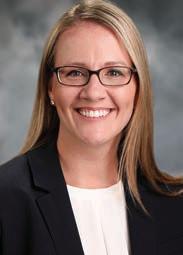
Marta Mulawa
PROMOTED TO ASSOCIATE PROFESSOR
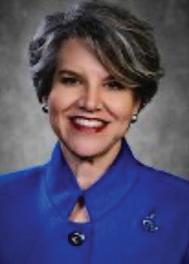
Valerie Sabol
APPOINTED FACULTY FELLOW IN THE NICHOLAS INSTITUTE FOR ENERGY, ENVIRONMENT & SUSTAINABILITY
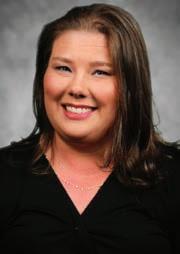
Allison Lewinski
PROMOTED TO ASSOCIATE RESEARCH PROFESSOR
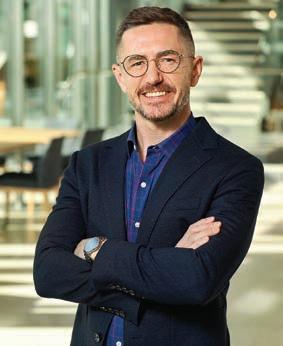
Ryan Shaw,
DUSON and Duke University Health System created a new position in 2025, Chief Nurse Innovation Officer, to be held by Dr. Ryan Shaw
Can you give some examples of projects or collaborations you might work on in this new role?
Q&A with Ryan Shaw, Nurse Innovator
What does your new role as Chief Nurse Innovation Officer entail, and what will you be responsible for?
RYAN SHAW: In my new role, I am responsible for establishing Duke Health as a destination for nursing innovation and excellence, grounded in the values of trust, inclusivity, and empowerment. Collaborating with Duke Nursing leaders and staff, we aim to create structures and opportunities for nurses to become innovators, driving meaningful changes in care delivery by addressing unmet needs and challenges to improve the health of patients, families, and communities.
What are some of your top goals as Chief Nurse Innovation Officer?
RYAN SHAW: One of the major goals is to establish an innovation pipeline that allows nurses to translate their ideas into solutions, ranging from small changes in care processes to designing new products. Nurses are natural innovators, constantly finding solutions to optimize care.
In my faculty role at DUSON, I have worked with many clinicians, including nurses, who have developed new care models and technologies, some of which have received FDA clearance through clinical trials I led and patents. DUSON’s academic programs and the Ruby L. Wilson Center for Nursing Science and Innovation will be key elements of the pipeline. Through this new joint role with the health system, we will scale these opportunities to nurses across the entire enterprise. Students will also come to DUSON to learn about the science of innovation while addressing strategic priorities within our health system. This includes plans to foster collaborations with the Pratt School of Engineering and Fuqua School of Business, where nurses will work with undergraduate and graduate students to create impactful solutions and care models.
AN INVITATION FROM RYAN SHAW

RYAN SHAW: For example, Duke Health is developing virtual care models that span inpatient and outpatient settings. Video conferencing technology paired with remote monitoring devices capture clinical data in the electronic health record, allowing us to envision new care models. A floor nurse in a patient’s hospital room can work with a virtual nurse who appears on the television, providing remote care such as patient education while being free from distractions on the hospital floor. This can alleviate the workload on the floor nurse and provide patients with dedicated time to review medications, treatment plans, and address critical aspects of care such as social determinants of health (SDOH). The virtual nurse can then follow the same patient from the hospital to their home, promoting continuity of care. This is already happening at Duke Health, where a virtual care center in Research Triangle Park increasingly supports Duke’s hospitals and clinics across NC. In this role I will support these new care models and work with teams on the design and evaluation for impact and success.
“Dr. Shaw’s visionary leadership and commitment to advancing clinical care will be instrumental in shaping the future. By bridging research, technology, and clinical care, he is helping to drive innovation, process improvement and improve the outcomes for our patients. His focus on collaboration, discovery, and forward-thinking solutions aligns with our mission to continuously elevate patient outcomes and health equity. We are excited about the impact Dr. Shaw will have in guiding Duke Health Nursing & Patient Care teams toward new frontiers in care delivery.”
Terry McDonnell, DNP, RN, ACNP-BC | Chief Nurse Executive, Duke University Health System and Vice Dean for Clinical Affairs, DUSON
How does this role further DUSON’s goals of advancing health equity?
RYAN SHAW: In this position, we will advance health equity by addressing disparities and improving access to quality care for all populations. Innovations like telehealth and AI can help us reach underserved communities and expand access to care. We can foster initiatives where nurses are empowered to address SDOH. For example, SDOH data can be captured in an electronic health record and, if addressed, can be reimbursed through Medicaid. This falls within the nursing scope of practice, and we can learn from successful models at other health systems to bring these practices to Duke Health.
I’m excited to collaborate across disciplines, hear ideas, and co-create solutions that matter to you, our patients, families, and the communities we serve. If you are passionate about innovation and transforming care, let’s connect. The innovation door is open, let’s build the future together! nursinginnovation@duke.edu
PhD, RN, FAAN
Terry McDonnell
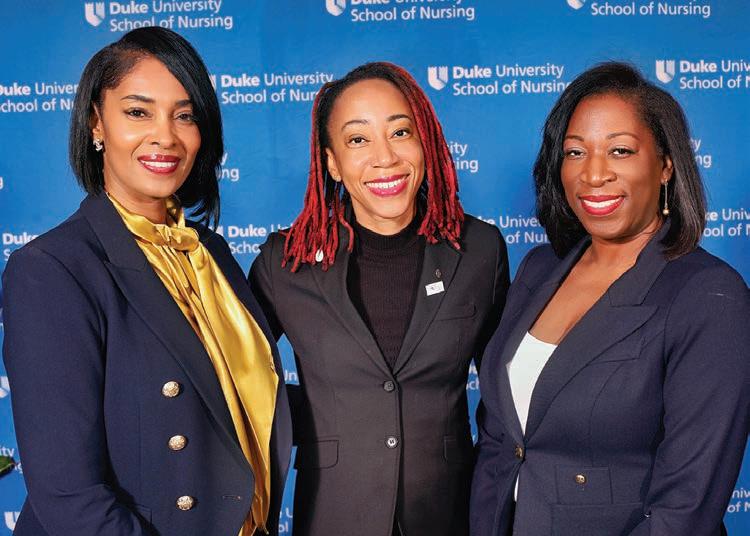
In the fall of 2024, Associate Professor Schenita Randolph, PhD, MPH, RN, FAAN, was awarded a grant from the National Institute of Nursing Research (NINR) to support a five-year initiative on HIV prevention among Black women. Working alongside her co-investigator, Associate Professor Ragan Johnson, DNP, FNP-BC, CNE, Randolph envisions beauty salons—and the stylists who work there—as potential conduits of information and intervention that can help address health disparities.
According to data collected in 2022 by the Centers for Disease Control and Prevention, Black women account for 50% of new HIV diagnoses among women in the United States, though they only make up 13% of the female population. Moreover, Black women account for the greatest share of deaths among women with diagnosed HIV, signaling a clear need for targeted HIV prevention among Black women.
“Prioritizing Black women in the HIV epidemic is critical given their disproportionate burden of disease and their roles as leaders in their families and communities,” said Dr.
Advancing Black Women’s HIV Prevention through a Beauty Salon-Based Intervention
By Jessica Covil-Manset, PhD
Randolph. “Reaching Black women strengthens families and communities, contributing to broader societal benefits.”
“I am excited to be a Black woman who has partnered with other Black women to develop and implement socially and culturally relevant strategies that consider our lived experiences of where we work, live, and socialize,” Dr. Randolph added.
The Intervention and Its Beginnings
Drs. Randolph and Johnson began their partnership at the HEEAT Lab, where Dr. Randolph serves as Principal Investigator and Founding Director and Dr. Johnson serves as co-investigator. Other key members include Elizabeth Jeter, PhD, Research Associate, and Niasha Fray, Clinical Research Coordinator.
The HEEAT Lab focuses on reducing sexual health disparities and HIV through community engagement, advocacy, and trust-building strategies. The grant builds on Drs. Randolph

and Johnson’s previous research published in The New England Journal of Medicine detailing the findings of their efforts to recruit and train salon stylists as sources of information on HIV, pre-exposure phrophylaxis (PrEP), and infection control. The intervention included a six-week, web-based edutainment video series, structured debrief blogs, and telehealth service access.
These efforts led to an increase in knowledge and positive views of PrEP among Black women in the South who were previously unaware of it. The grant will expand this intervention to a larger and more geographically diverse sample.
Currently in year one of the grant, Drs. Randolph and Johnson have so far focused on hiring research and intervention coordinators, developing a sustainability plan, and continuing to build rapport with the beauty industry across North Carolina.
“I am most excited about continuing the work we started and reaching more Black women across the state. We have an opportunity to educate Black women and potentially change lives,” said Dr. Johnson.
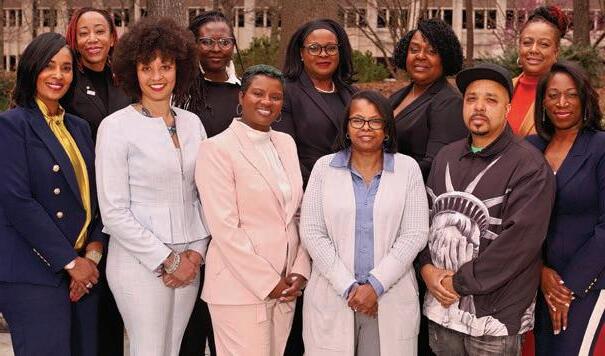
Dr. Schenita Randolph, Community Organizer Crystal Taylor, Dr. Ragan Johnson
Drs. Johnson and Randolph with HEEAT Lab affiliates.
DUSON faculty
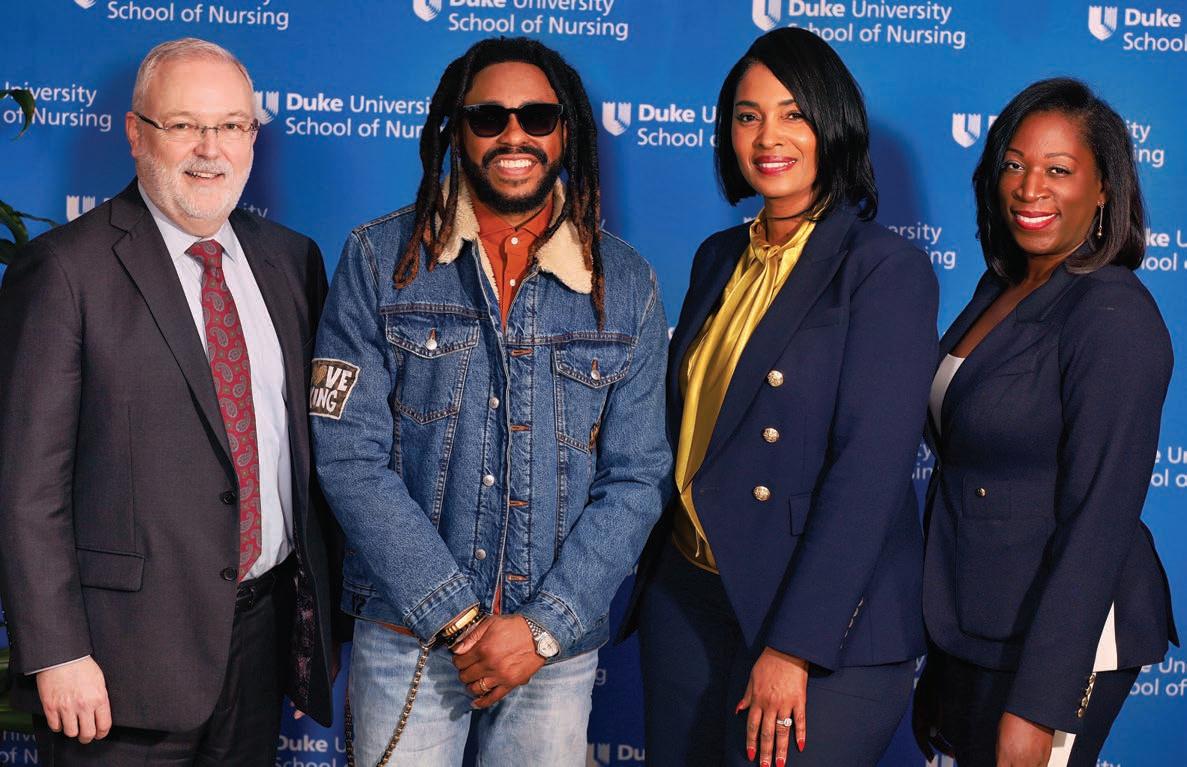
Involving DNP and PhD Students
The partnership between Dr. Randolph, who is PhD-prepared, and Dr. Johnson, who is DNP-prepared, is a testament to the benefits that these distinct degree backgrounds can offer each other. They intend to create more collaborative opportunities such as theirs through this initiative.
“The benefits of purposeful collaboration between PhD and DNP nurses are well documented, particularly in the advancement and dissemination of nursing science,” said Dr. Randolph. “DNP and PhD nurses, through strategic collaboration, can drive innovative, evidence-based interventions and policy changes that advance health equity and improve patient outcomes. “
According to Drs. Randolph and Johnson, both PhD and DNP students will be engaged in their work at various levels; for example, DNP students might assist in translating portions of the research for use in clinical practice. They also hope to hire a postdoctoral fellow in the summer of 2025.
The students and postdocs involved in this initiative will not only gain invaluable learning
experiences, but also extend the reach and applicability of the initiative.
“This intervention will be a real-world, accessible intervention that is available to both community and clinical settings. It will be among the first nurse-led, community-partnered, evidence-based intervention for Black women and PrEP in the US South,” said Dr. Randolph.
The Time Is Now
“It is important that those who believe in advancing equity—and improving health outcomes for communities most impacted—do so. Change what you can while you can,” said Dr. Randolph. “A strong understanding of your why is more critical now, and particularly important at this time.”
Pointing to the United States Department of Health and Human Services’ Ending the HIV Epidemic in the US initiative, Dr. Randolph added: “If this work is not done, we threaten progress toward the Ending the HIV Epidemic initiative’s 2030 goals, and we will have this same conversation for our children's children 30 years from now.”
Dr. Johnson, for her part, spoke to the almost limitless implications of this initiative, perhaps reaching even beyond the United States.
“I envision this work being global,” said Dr. Johnson. “The culturally relevant modules and entertainment videos can be far-reaching, replicable, and can be re-purposed in multiple ways to reach new audiences such as through social media, community health organizations, and healthcare providers.”
Drs. Johnson and Randolph also bridged nursing science and education with the broader community, organizing a Black Women’s Health Symposium at the School of Nursing in March (Women’s History Month) that was open to community members.
Titled “Science of Soul: Where Culture Heals, Art Speaks, and Science Transforms,” their symposium included TEDx-style talks featuring community and academic leaders addressing key topics in Black women’s health, in addition to a panel discussion with Grammy-winning artist and community advocate Raheem DeVaughn.
“My long-term goal is that Black women will see themselves in HIV prevention and messages,” said Dr. Randolph. “Black women will lead in research, clinical trials, policy, and other decision-making opportunities that impact the health of their families and communities.”
L-R: Dean Relf, Grammy Award-winning R&B Artist Raheem DeVaughn, Dr. Randolph, Dr. Johnson
Alumna Gail Parker Honors Former Professor Nancy Woods with $1M Nursing Scholarship Endowment
By Wendy Graber
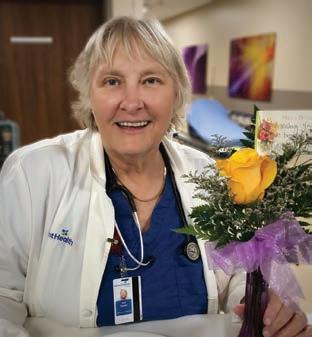
Gail Parker, pictured above, will benefit future nursing students for years to come with the gift she made in honor of her mentor, Nancy Fugate Woods. At right: Woods featured in an August 1977 edition of "Intercom", a publication of Duke University Medical Center. Woods was working on a data-collection study of local pregnant women.
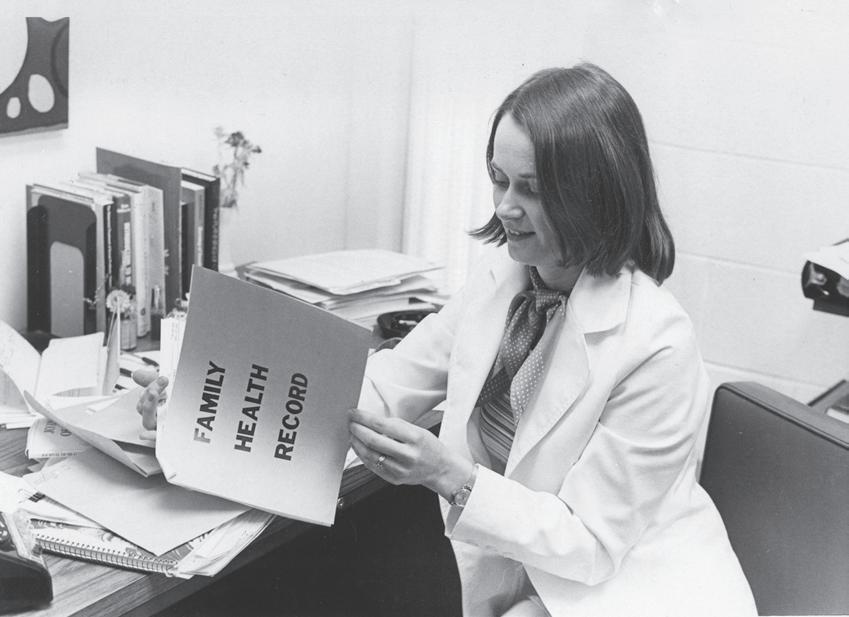
Gail Parker, BSN’78, FNP, embodies the power of compassion and reminds us that we too can make a difference in the lives of others. Not only did Parker choose a career focused on helping people at their worst moments, she recently endowed a $1 million scholarship at the School of Nursing to help students achieve their dreams.
“Duke gave me an opportunity, an education, and helped me achieve my goal of becoming a nurse,” said Parker. “Having a Duke degree has opened a zillion doors for me, giving me opportunities that I am grateful for.”
She grew up in a military family, and like most military families, hers moved a lot, giving her early exposure to different cultures and places. When her family settled in Florida and it was time for her consider where to go to college, she chose Duke because she knew she would meet people from different backgrounds and diverse geographies and most importantly, it was a place that would challenge her academically.
“I liked science, and I liked caring for people,” recalled Parker. “I had volunteered as a candy striper in high school. Given that opportunities for women in medicine were limited, I really didn’t think about medicine as a career option except in terms of nursing.”
When Parker arrived at Duke in 1974 for her undergraduate studies, she filled her electives with English and anthropology classes her first two years before beginning the nursing curriculum in earnest her junior year. It was an exciting time. The curriculum had just been revised in 1971, and the school was led by Ruby Wilson, PhD’69, RN, FAAN, a dynamic and pioneering dean. Parker met a young faculty member named Nancy Fugate Woods, PhD, RN, FAAN, whom she describes as the most inspiring professor and best mentor she ever had. Parker took a forward-looking human sexuality class that was co-taught by Woods and Ann Mandetta, RN, MPH, her junior year. Her senior year, she received permission from Woods to take a graduate-level course with a clinical rotation in the same
topic and an independent study with Woods studying bias against women in medicine with her.
Woods recalls her time at Duke as one of the highlights of her career.
“I was so excited to go to work every day,” said Woods. “I was thrilled to be part of an environment where there was an openness to new material and new methods of teaching. If you could think of a topic that you thought was important to have in a curriculum for people who were going to be health professionals, you could do it. I probably worked harder than I ever did in my life.”
Parker’s scholarship, the Nancy Fugate Woods Endowed Scholarship, will honor Woods for her inspiration, dedication, and legacy of mentorship to thousands of nursing students, and for the impact she made in the fields of health care, nursing, and leadership development. Parker’s initial gift of $300,000 to the endowment will provide vital support to School of Nursing students now. Her additional estate gift of $700,000 will significantly enhance the fund and provide lasting scholarship support for decades to come.
Woods left Duke in 1978 for the University of Washington, where she became a leading expert on women’s health and served as dean of the nursing school from 1998-2008. She retired in 2017.
As one of those students who was challenged and inspired by Woods, a large part of Parker’s career focused on helping people at the margins of society. After graduating from Duke, she spent a few years in Los Angeles working at a big trauma center before heading to graduate school at Emory University to train as a nurse practitioner. She next worked in public health at a clinic in a low-income, neighborhood in Atlanta. To make ends meet, she also worked weekends as a nurse in a nearby emergency department. In 1987, at the height of the AIDS epidemic, she joined the staff in a newly established AIDS clinic at Grady Hospital, a large teaching hospital in downtown Atlanta.
“It was such a painful time,” recalled Parker. “When the clinic opened, we had about 100 patients, but by 1994 when I left, we had taken over the whole building. At the beginning there were no drugs to treat the disease, and then when AZT was first available, we had to apply directly to Burroughs Welcome to obtain the drug.”
Parker recalls seeing a lot of marginalization — patients being shunned, not receiving good treatment and even being denied care — and felt obliged to help. She felt very strongly that all of us, no matter our situation, deserved medical care, and as a gay person she saw her community in a crisis of life and death.
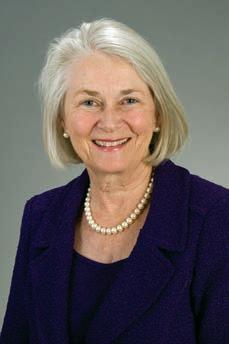
Nancy Fugate-Woods
“It was a calling in many respects,” said Parker. “I also learned so much medicine. Because these patients had no immune system, we treated diseases that you just didn’t see in other practice settings. It was really the worst job and best job all at the same time. Despite the utter bleakness, out of this time of despair grew a gay movement that was ultimately empowering and enlightening. So good things came out of it as well as horrific things.”
By 1994, Parker, who had continued to work weekends as an emergency department nurse, was burned out. She accepted a newly formed nurse practitioner position in the emergency department at Grady. Parker deeply enjoyed her work in academic medicine. After that she worked in the emergency departments at several hospitals as well as urgent care centers in Atlanta and then in Florida when she moved back to the Orlando area in 2019.
Beginning with her first contribution of $200 to the Florence K. Wilson Scholarship Fund in 1979, Parker has been a steadfast supporter of the School of Nursing. A diligent saver, Parker believes strongly in giving back for the opportunities she’s been given.
“Gail embodies the very spirit of service that we strive to instill in our students and this gift exemplifies how our faculty can make a difference in a student’s trajectory,” said Dean Michael V. Relf, PhD, RN, AACRN, ANEF, CNE, FAAN. “This remarkable contribution will not only enhance our programs but also inspire future generations of nurses to make a profound impact in communities near and far.”
Many years ago, Woods set a powerful example by putting her values into action, inspiring Parker to dedicate herself to doing the same. Now Parker is the one inspiring Woods.
“I am deeply humbled,” said Woods. “I've had the good fortune over the years to have students express gratitude and appreciation, but this is just one of those moments where I'm deeply touched and inspired. I admire Gail’s values. She has inspired me to do something similar.”
Duke University School of Nursing Receives $4.1 Million Estate Gift from Dean Emerita Ruby L. Wilson
By Sarah Morrison
Duke University School of Nursing alumna and Dean Emerita
Ruby L. Wilson, EdD’69, MSN, RN, FAAN, provided the School with a generous gift of $4.1 million through her estate. This impactful contribution will support an international visiting professorship, as well as Duke’s Center for Nursing Research, to be renamed in honor of Wilson’s philanthropy, service, and accomplishments in elevating nursing science during her tenure at Duke.
The newly named Ruby L. Wilson Center for Nursing Science and Innovation places nurses at the core of transforming healthcare, providing resources to support faculty, students, practitioners, and researchers in advancing nursing and interdisciplinary science. The Center will serve as a hub for innovative research, fostering advancements in nursing science and practice. It will facilitate interdisciplinary collaboration to bring together experts from various fields to address complex healthcare challenges.
“The incredible impact Ruby made through her visionary leadership and contributions to the nursing profession cannot be measured,” said Dean Michael Relf, PhD, RN, ANEF, FAAN. “We are grateful and honored to build on her legacy as the Center continues to elevate the School as a leader in nursing science, empowering nurses with the latest knowledge and skills to support equitable healthcare, and become leaders in the field.”
Wilson joined the School’s faculty in 1955 with a goal of rethinking the nursing profession. She contributed to the development of an advanced medical-surgical nursing course as well as the School’s master’s program in clinical nursing, which became a national model. In 1963, Wilson helped to develop the Clinical Nurse Specialist position at Duke University Medical Center and was the first nurse to serve in the role, providing care for dialysis and kidney transplant patients in the Division of Nephrology.
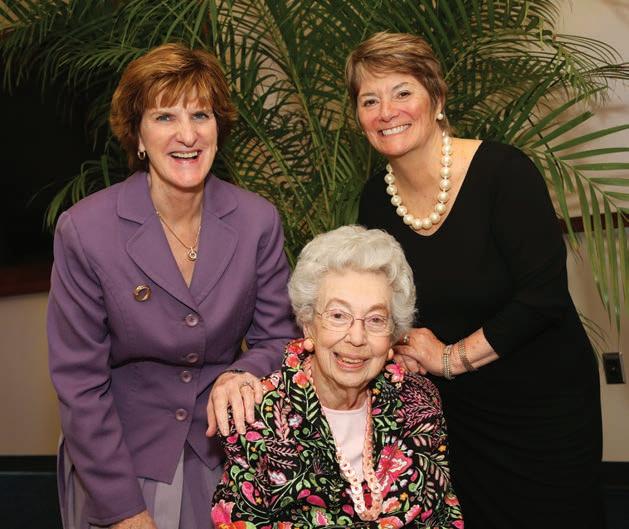

At left: Deans Emeritae Marion Broome, Catherine Gilliss, and Ruby Wilson. At right: Ruby Wilson receiving the North Carolina Nurses Association Hall of Fame Award.
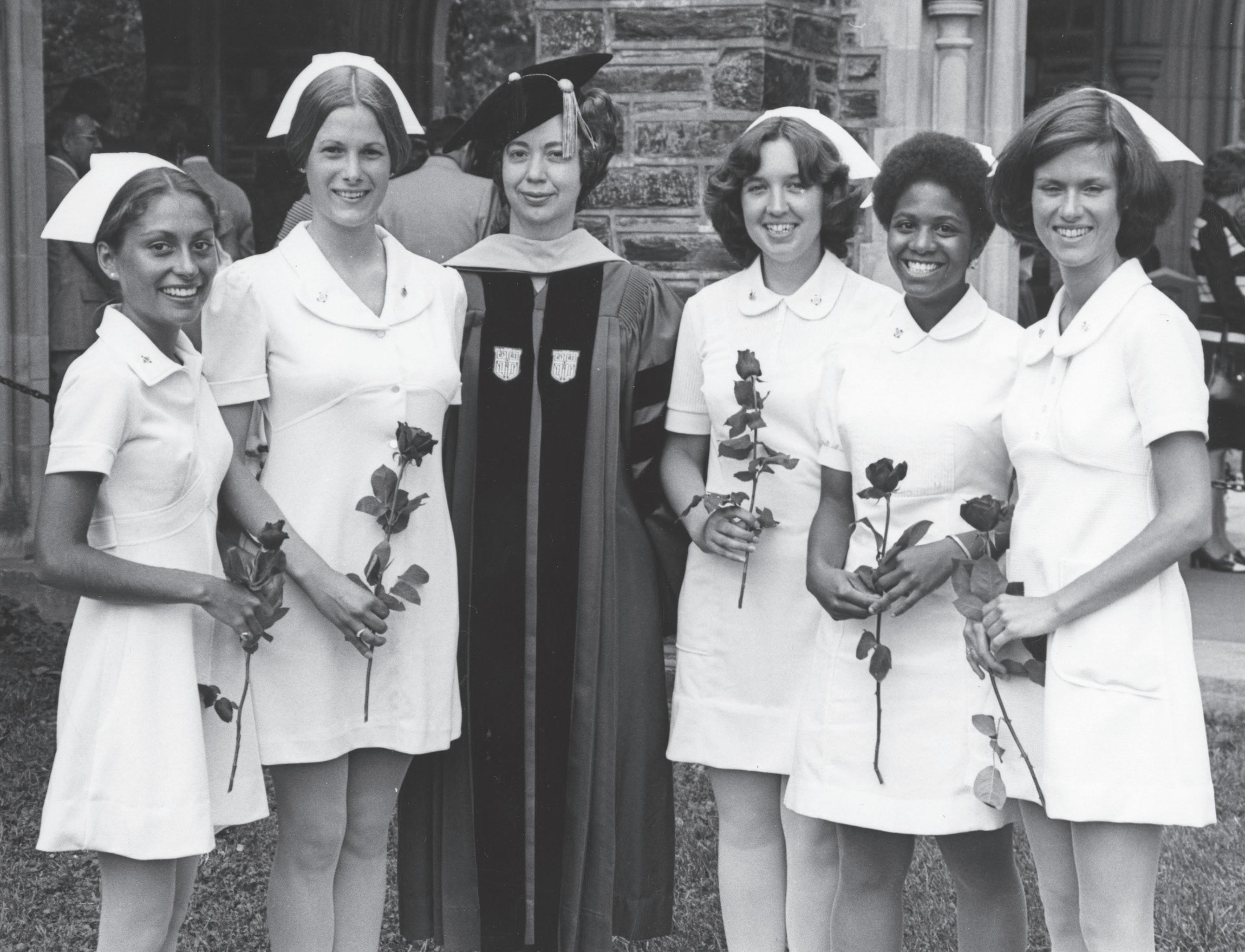
In addition to her faculty appointments in the Schools of Nursing and Medicine, Wilson received a special appointment in the Department of Nursing Services at Duke University Hospital, making her the only nurse to have a triad appointment in the Duke Medical Center. Wilson was also a passionate early health and nursing advocate who helped draft nursing bills, testified before Congress, and met with congressional health committees.
During Wilson’s tenure as dean from 1971-1984, she facilitated the development of an innovative undergraduate curriculum, and her strong leadership and passion for nursing education shaped the School into an esteemed institution known for research, innovation, and excellence.
Throughout her long career, Wilson’s outstanding achievements were widely acknowledged by both Duke and the nursing profession at large. In 2006, Wilson was awarded Duke University’s highest employee honor, the Distinguished Meritorious Service Award; she was the first woman from the Medical Center to receive the award. In 2007, the Ruby L. Wilson Professorship was established in her honor, providing
key resources for esteemed faculty. In 2008, she received the Lifetime Achievement Award from the Duke University School of Nursing Alumni Association, in 2009, Wilson was named a Living Legend by the American Academy of Nursing, and in 2010 she was inducted into the North Carolina State Nurses’ Hall of Fame. In 2013, friends, colleagues, and Duke University School of Nursing alumni joined together to establish the Ruby Wilson Student Scholarship Endowment fund in her honor.
Wilson supported Duke University and the School of Nursing with her leadership and gifts throughout her lifetime. Her 50 years of generous philanthropic support for the school culminated in her estate gift, which provides significant progress towards the School’s $10 million goal to raise for the Center in Duke’s MADE FOR THIS campaign.
Wilson’s colleague Gwen Waddell-Schultz, MSN, RN, NE-BC, served as her caregiver and executor of her estate. "Ruby’s steadfast dedication and pioneering contributions to the nursing profession live on in this legacy,” Waddell-Schultz said.
“This is her gift for the future of nursing.”
Ruby Wilson with students at a 1975 awards ceremony; L-R: Kathy Noble, Lisa Flint, Ruby Wilson, Marshall Sutton, Chris Harris, and Marcia Bacon
NURSING LEADERS: DUKE ALUMNI MAKING A DIFFERENCE
By Schenita Randolph, PhD, MPH, RN, FAAN
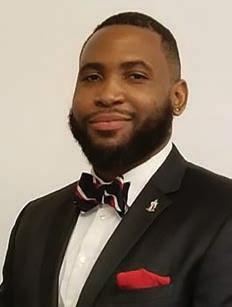
Vernon
Championing Change: Tedrick Vernon’s Impact on CRNA Education
Dr. Tedrick Vernon, DNP’18, CRNA is a lot of things: leader, advocate, mentor; known for his transformative impact on healthcare education and his unwavering commitment to health equity. As one of the first African American male Certified Registered Nurse Anesthetists (CRNAs) in North Carolina, Vernon has dedicated his career to fostering diversity within the CRNA profession and improving healthcare access for underserved communities.
Vernon earned his undergraduate nursing degree from North Carolina Agricultural and Technical State University in 2008 and his Doctorate in Nursing Practice (DNP) from DUSON in 2018. His leadership, dedication, and vision have significantly influenced both the academic community and the region, but perhaps his biggest impact has been made through his effort to recruit more nurses of color into the field of anesthesia. Through his work with the Diversity CRNA program, Vernon has been a transformative force, serving as co-chair of historically Black college and university (HBCU) tours. With less than 10% of the CRNA workforce identifying as people of color, Vernon has volunteered countless hours to touring across the United States to bring awareness to the role of the CRNA and improve representation.
The Diversity CRNA program, founded and led by CEO Dr. Wallena Gould, EdD, CRNA, FAANA,FADLN, FANN, has become a national model for demonstrating how intentional efforts can cultivate an academic environment that reflects the communities it serves. The program consists of tours to colleges and universities and includes presentations highlighting the benefits and requirements of the CRNA profession. They also provide free GRE and NCLEX books to students in need and offer hands-on skills labs where undergraduate students practice advanced nursing skills. Through this program, Vernon has toured and presented at North Carolina A&T State University, Howard University, Virginia Commonwealth University, Duke University School
of Nursing, and many others. His commitment to the workforce within healthcare education has opened doors for countless students from underrepresented backgrounds, fostering a more inclusive pipeline of healthcare professionals. In 2024, the American Nurses Association awarded Diversity CRNA with an Innovation Award in the "NurseLed Team" category for the Immersion Model for Diversifying Nurse Anesthesia Programs.
Vernon's passionate and unselfish commitment to addressing underrepresentation in the profession has a direct impact on the healthcare system, communities, and society. His mentorship of CRNA students who share his lived experiences and background provides guidance, support, and inspiration, helping future nurse leaders navigate the challenges of their educational and career journeys. Since 2016, Vernon has given presentations to over 2,500 undergraduate nursing students, many of whom have decided to pursue careers as CRNAs.
Beyond his impact on academic diversity, Vernon is deeply engaged with the local community. He has spearheaded numerous outreach programs focusing on health education, mentorship, and support for young people aspiring to enter healthcare professions. His passion for giving back is evident in his collaborations with community organizations to address disparities in healthcare access and outcomes.
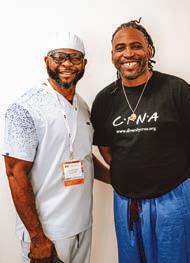
Dr. Tedrick Vernon stands out as a transformative change agent in expanding the workforce of certified registered nurse anesthetists. His ability to forge strategic partnerships and inspire collective action has significantly contributed to the increase in skilled CRNAs, meeting critical healthcare demands. He represents the best of what nursing can be, taking the mission of DUSON to heart and turning it into direct action to better not only the nursing profession, but society as a whole.

Tedrick
Duke Alumni Making a Difference
By Matt Lardie and Jessica Covil-Manset
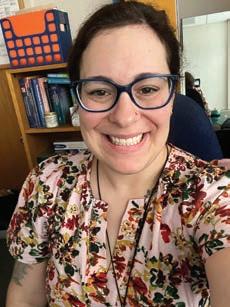
Stephanie Edwards-Latchu, ABSN’14, MSN’20
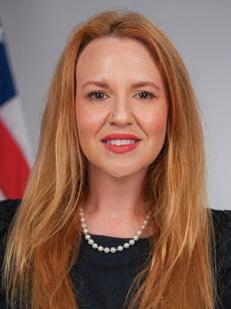
For Stephanie Edwards-Latchu, profoundly personal experiences with the healthcare system set the stage for her nursing career. Edwards-Latchu, a former enlisted Sergeant with Army intelligence, twice found herself on the receiving end of care that ran the spectrum from empathetic and caring to cold and distant.
“The first time was when I was seriously ill with norovirus, and the nurse who was taking care of me stayed for two hours past her shift to care for me,” she recalled. “The second time was an emergency department visit for a miscarriage. The nurse who was assigned to me was cold, displayed zero compassion, and gave me incorrect information about what I was experiencing. I wanted to be like the first nurse.”
Edwards-Latchu transformed those two incongruent experiences into a commitment to women's health, particularly around pain control for women. A graduate of DUSON’s Women’s Health Nurse Practitioner program, she was quoted last year in a CNN article discussing the importance of effective pain management during IUD insertion. Edwards-Latchu highlighted the inadequacy of premedication with ibuprofen, which does not significantly reduce pain during the procedure, especially for nulliparous (those who have never given birth to a live child) patients.
DUSON's mission to train nurse leaders who advance health equity strongly impacted Edwards-Latchu's approach to healthcare. She noted that Duke challenged her to examine her implicit biases and facilitated discussions on healthcare disparities. Now a nurse practitioner with UNC-Chapel Hill student health, Edwards-Latchu is adamant about advocating for adequate pain control methods for all women, not just some. “Disparities in pain control are especially egregious in BIPOC women,” Edwards-Latchu pointed out, calling that a “completely unacceptable truth” in today’s healthcare environment. “If superior pain control exists (which it does), that is what we should be offering to our patients.”
Edwards-Latchu's work in pain management and her advocacy for marginalized patients demonstrate her unwavering commitment to improving healthcare outcomes for all. “My patients are mostly nulliparous, college-aged people with a uterus, of multiple genders and ethnic backgrounds. I love providing care for them and constantly work to improve that care.”
“If superior pain control exists (which it does), that is what we should be offering to our patients."
—
STEPHANIE EDWARDS-LATCHU
Michael Elizabeth Kennedy, DNP, ANP, AGACNP, PMHNP, CCRN-CMC, CHFN
White House Fellow, United States Coast Guard
Michael Elizabeth Kennedy's path to a prestigious White House Fellowship has been marked by a series of academic and professional achievements. Her educational journey wound its way through eastern North Carolina (where she was born and raised)—from Lenoir Community College, through Barton College, and on to East Carolina University before it landed her at Duke, where she obtained both psychiatric mental health nurse practitioner and adult gerontology acute care nurse practitioner post-master’s certificates.
Throughout her career, Kennedy has been driven by a desire to improve healthcare access and outcomes, particularly in rural areas. “In the US, zip codes reflect morbidity and mortality, my work has always been geared toward reducing this,” she says. Her time as an acute care nurse practitioner at Carteret Health Care in Morehead City, North Carolina, highlighted the unique challenges faced by rural healthcare providers and patients. This experience fueled her passion for nurse advocacy and her belief in the importance of nurses taking on leadership roles in healthcare.
It was a suggestion from Ernest Grant, PhD, RN, FAAN, former president of the American Nurses Association and Vice Dean for Diversity, Equity, Inclusion, and Belonging, that lit the spark that landed her in Washington, DC. Recognizing the rarity of nurses being selected for the White House Fellowship, Kennedy decided to apply. The nonpartisan program, established in 1964, offers emerging leaders the chance to work with senior White House staff, cabinet secretaries, and other top-ranking administration officials during their year-long fellowship.
During the selection process, Dr. Kennedy had to navigate a series of interviews, both virtually and in person, while balancing her professional responsibilities. Her perseverance paid off when she was appointed by President Biden as one of the 15 finalists for the 2024-25 class of White House Fellows. She found a home at the US Coast Guard, where she was particularly interested in the challenges facing Coast Guard enlistees and their families, many of whom are stationed at bases in rural areas. Rural service members are forced to utilize private care instead of the military healthcare system and must navigate the complicated process of reconciling that with the Department of Defense’s Tricare insurance program.
Kennedy views advocacy as a critical component of nursing. "I'm like many APRNs,” she insists. “The initials behind my name are not reflective of my accomplishments but better represent the desperate need for care in rural America."
She believes that nurses, with their unique perspectives and close patient interactions, are well-positioned to advocate for policies that ensure equitable access to healthcare for both military and civilian populations. Her work in rural health and her role as a White House Fellow underscore her commitment to ensuring that all individuals have access to quality healthcare, regardless of their geographic location.
Duke Alumni Making a Difference
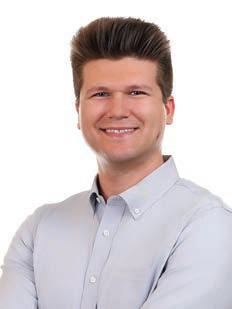
Nicholas Biondo, ABSN’24
TThereare many paths one can take to find their true calling, and no one knows that better than Nicholas Biondo. Before stepping into the world of nursing, Biondo began his professional career as a Veterinary Technician. This role, which he described as being an "animal nurse," was pivotal in shaping his nursing philosophy. "I learned much of my patient-forward mindset and developed my bedside manner in this job, especially since many of the difficult conversations in veterinary medicine mirror the experience of tough conversations in nursing," Biondo explained.
Biondo's experience in veterinary medicine provided him with a unique perspective on patient care. He found joy in helping clients care for their pets and teaching them how to do so effectively. This enthusiasm for education and support translated seamlessly into his nursing career. "I found a passion for caring for creatures when they couldn't care for themselves. I also enjoyed the challenge of taking care of a patient that couldn't directly tell me what was wrong with them and what help they needed," he said.
Biondo's decision to pursue nursing was influenced by a conversation with his cousin, who highlighted the significant impact nurses have on patient care. "Nurses are the number one profession in the hospital to have the most hour-to-hour contact with patients. And that time is where the healing happens," his cousin had told him. This realization, coupled with his desire to provide direct care and education to patients, solidified his decision to switch from veterinary medicine to nursing.
"DUSON did an excellent job teaching me not just the concepts needed to be known as a highly competent nurse leader but also the technical skills and emotional and mental mindset needed to thrive in this profession," Biondo recalled. That leadership mentality has extended beyond his clinical practice. He currently serves on the Nursing Alumni Council (NAC) at DUSON, a role he was interested in even before graduating. "I was interested in joining the Nursing Alumni Council at DUSON even before I graduated from DUSON. I had come to speak with the NAC several times prior to graduation and saw how they were a community of supportive and like-minded nurses that I could continue to improve my practice with and stay tied to DUSON and their mission and vision," he explained. Biondo recently furthered his commitment to the school by stepping into the role of President-elect of the Nursing Alumni Council.
Biondo’s diverse experiences have enriched his nursing practice, and his commitment to the Nursing Alumni Council reflects his desire to give back to the community and support the next generation of nurses. “A DUSON-educated nurse knows how to ask ‘why’ when a problem presents itself that an answer hasn't come up for yet,” Biondo asserted. “A DUSON-educated nurse knows how to create an evidence-based practice implementation and coordinate with key stakeholders at the hospital to improve that practice. A DUSON-educated nurse knows to also keep a focus on how what they do affects their patients, and in this way, advances health equity for all.”
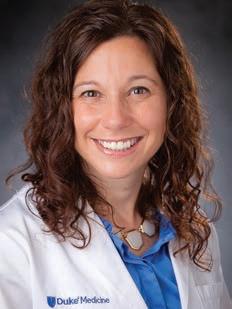
Melissa
Fike, DNP’19,
Asthe Director of Advanced Practice Providers (APP) at Duke Primary Care, Melissa Fike has emerged as a leader committed to advancing health equity while advocating for the professional development and continued success of APPs across the Duke Primary Care network. In her role, Fike oversees a network of nurse practitioners and physician assistants across various specialties, including primary care, internal medicine, internal medicine-pediatrics, urgent care, and pediatrics. Her role involves supporting APPs in their professional growth, improving care delivery, and ensuring they are set up to provide the best outcomes for patients. Fike's leadership is characterized by her dedication to creating an environment where APPs can thrive and deliver high-quality care. With a seat at the table when it comes to decision making, she can advocate for APPs in both strategic and compensation discussions.
“One of the most exciting opportunities I’ve had in this role was creating an entirely new type of clinic called the New Patient Access Center, designed to improve access and streamline care for our patients,” Fike said. The clinic is staffed entirely by APPs and Fike noted that its success has drawn interest from other large health systems across the country.
Fike's nursing journey began with a strong foundation at Duke, where she pursued her BSN, MSN-FNP, and DNP degrees following a career in social work. Through her education, Fike developed a deep understanding of healthcare systems, policy, and the importance of advocating for both patients and the nursing profession. She credits her time at Duke for not only being essential to her ability to manage teams effectively and influence positive changes within the healthcare system, but also for emphasizing cultural humility (engaging with others with the intent of honoring their beliefs, customs, and values), patient-centered care, and addressing disparities in healthcare, all of which laid the groundwork for her commitment to health equity.
Fike has continued to practice as a Family Nurse Practitioner a few days a week, ensuring she remains connected to patient care and the challenges faced by healthcare providers. Her hands-on approach and dedication to continuous learning include her recent enrollment in an executive MBA program.
“As the Duke Primary Care Director of Advanced Practice Providers, I have the privilege of supporting our amazing team of nurse practitioners and physician assistants across our network,” said Fike. “DUSON prepared me for this career by providing not only a solid clinical foundation but leadership and advocacy training that has been essential in my ability to manage teams effectively and influence positive changes within the healthcare system.”
Duke Alumni Making a Difference
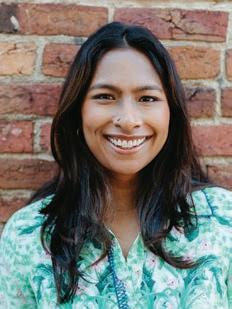
Mumta Hannan Chambers, BSN’18 , DNP’25
If at first you don’t succeed, try, try again. The time-worn saying applies to so many aspects of everyday life, but for Mumta Chambers it reflects a journey to nursing success marked by perseverance and a deep commitment to patient care. From an early age, Chambers knew that nursing was her calling, driven by a desire to care for others. Despite setbacks, including an initial rejection when applying to nursing school, she remained undeterred, seeking feedback and strengthening her application until she was finally accepted.
During her time at Duke, Chambers immersed herself in various rotations that shaped her career. A memorable maternity rotation solidified her passion for parturient health, while a community health rotation in the Philippines deepened her understanding of global health and preventative care. Her capstone in a cardiothoracic surgery unit, influenced by her Bengali community's prevalence of heart disease, led her to specialize in cardiac nursing. While a student at DUSON, Chambers was awarded the Ruby L. Wilson Award for Clinical Excellence in Nursing.
After graduating, Chambers began her career at Duke University Hospital’s Heart Center, working in both the cardiothoracic stepdown unit and the cardiothoracic surgical ICU. These experiences, though challenging, were instrumental in her growth as a nurse, allowing her to celebrate patients' successes and mourn their losses, all while recognizing the shared humanity and values between herself and her patients.
Her dedication to nursing extends beyond clinical practice. Inspired by her mentors, Chambers became a clinical instructor for the ABSN program, guiding future nurses with the same passion and commitment she experienced from her own instructors. At the same time, a desire to continue her nursing education led her to nurse anesthesia, where she combines clinical expertise with advocacy and education. As a doctoral student, she focuses on incorporating Point of Care Ultrasound into everyday practice and remains committed to improving health outcomes, particularly for people of color.
In addition to her clinical and educational roles, Chambers is an advocate for the nurse anesthesia profession within North Carolina, working with government officials to highlight the importance of advanced practice nurses in providing excellent, evidence-based care. Her story captures the resilience, teamwork, and dedication required in nursing, and she continues to inspire others with her unwavering commitment to the profession.
“Nursing can take you on paths you never could have imagined. It challenges you, stretches you, and opens doors you didn’t even know existed. It introduces you to people who will change your life, and it constantly pushes you toward growth. Nursing teaches you how to be a fierce advocate, not only for your patients, but also for yourself.”
— MUMTA CHAMBERS
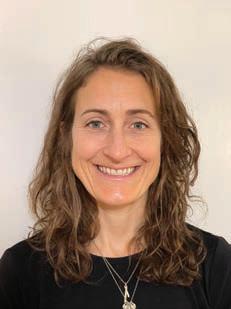
Betsy Smith, DNP’24, APRN, FNP-C
Beforegraduating in August 2024, Betsy Smith visited Tanzania’s Bugando Medical Centre and conducted a project aimed at improving hazardous drug safe handling practices. Hazardous drugs, which are used to treat cancer and other conditions like rheumatoid arthritis and multiple sclerosis, are toxic to cells. Safe handling policies are necessary to prevent harmful exposure to patients, medical personnel, and the environment.
With plans to open a new oncology hospital in late 2023, Bugando Medical Centre requested a revision to their hazardous drug safe handling policy, which was last developed in 2015.
Smith, who began her DNP program in 2022, says that the project was highly involved but also highly rewarding. While it added more time to program completion, the project enabled Smith to gain experience in applying for grants and international IRB approvals, as well as working with multiple collaborators across countries.
“Most DNP students do their projects at the site where they’re currently practicing,” said Smith. “But I really wanted to look internationally and to use the resources available at Duke in service of a site that is asking for collaboration and who might really benefit from it.”
Due to limited resources and staff shortages, 32% of low- and middle-income countries are able to follow hazardous drug safe handling standards, compared to 60% in high-income countries.
After the site assessment, the revised safe handling policy took about a year and a half to develop and included multiple reviews by content experts. The project also included the translation of a hazardous drug questionnaire, along with the development of staff educational sessions focused on exposures, recommended personal protective equipment (PPE), and workplace safety.
Smith says that policy implementation would be the next step after policy development, which would involve sampling hospital surfaces for hazardous drugs, instituting a recommended safety measure, and then resampling to test effectiveness.
Smith, whose DNP was funded through the Nurse Faculty Loan Program, is now teaching at a Lourdes University in Northwest Ohio while still practicing as a family nurse practitioner. She plans to apply for a clinician scholar program with the hope of moving further into policy work in low- and middle-income countries.
2024
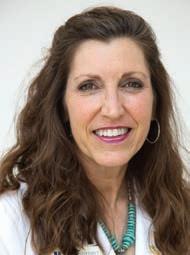
Ann White, MSN’92
CLINICAL PRACTICE AWARD
ABy Troy Pinkins
The Duke University School of Nursing has a long history of excellence. Every year we recognize alumni and individuals for continuing this legacy of excellence through their contributions to nursing science, service to DUSON, and commitment to advancing health equity. This year we are recognizing five individuals who have demonstrated notable excellence. Each recipient exemplifies what it means to be a leader in the clinical, educational, or research domains.
nn M. White graduated with honors from Alverno College in 1980 and pursued a Master of Science in Nursing at Duke University, specializing in emergency, critical care, and trauma nursing. She completed her MSN in 1992, with a thesis on intravenous epinephrine in anaphylactic shock, under the guidance of esteemed professors.
Ann began her career in a busy emergency department in Green Bay, Wisconsin, where she developed her clinical and leadership skills. Upon completing her MSN, she became an Emergency Department Nurse Manager, focusing on hiring new graduates and enhancing emergency department processes. In 1996, Ann transitioned to teaching at Barton College, excelling in both classroom and clinical settings while continuing to work as a staff nurse.
In 1998, Ann joined Rex Healthcare as a Critical Care Clinical Nurse Specialist (CNS), where her innovative practices led to improved patient outcomes and cost savings. She also developed programs for new nurses and staff career advancement and continued to teach and precept students.
Ann served as an executive member of the Nursing Alumni Council from 1999 to 2001, acting as an ambassador for Duke University School of Nursing and strengthening connections between alumni, faculty, and the Duke community.
In 2002, Ann joined the School of Nursing as a faculty member, contributing to the development of the Center for Nursing Discovery and the accelerated BSN program. She later became the Emergency Services Clinical Nurse Specialist at Duke University Hospital, focusing on improving clinical outcomes and supporting novice nurses.
Ann lives in North Carolina with her husband, Rick, a North Carolina native, whom she met just before graduating in 1992. Formerly from Wisconsin, they now enjoy year-round tennis and golf, and the proximity to both the beach and the mountains. They divide their time between Raleigh and their mountain home in West Jefferson, NC, and love traveling and hiking with their beloved Boston Terrier, Ivanhoe.
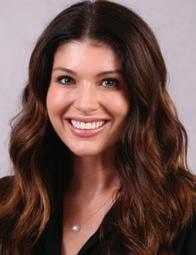
Gina Marie Wilson, DNP’16, MSN’14
HUMANITARIAN AWARD
I
n 2014, Gina Wilson earned her Master of Science in Nursing, Family Nurse Practitioner, from Duke University School of Nursing. Her clinical residency in Tanzania, where she encountered a challenging birth scenario, profoundly influenced her career path and led her to pursue a Doctor of Nursing Practice (DNP) focusing on neonatal mortality in developing countries.
After earning her BSN, Gina began her career as a bedside nurse at Wake Forest Baptist Hospital, specializing in women's health and oncology. She held various roles, including charge nurse and preceptor, and led a hospital-wide patient safety initiative. She received the Daisy Award for Extraordinary Nurses in 2012 and the Nursing Excellence Award in 2013. Following her MSN, she worked as a pediatric nurse practitioner while pursuing her DNP, which she completed in 2016. Her DNP project involved implementing a neonatal resuscitation program in Zanzibar, Tanzania, in collaboration with the Zanzibar Ministry of Health. This project evolved into the 501(c)(3) organization For Mamas, which has trained over 380 nurse-midwives and provided resuscitation supplies to numerous clinics.
Since 2016, Gina has been working at Lincoln Community Health Center in Durham, North Carolina, serving diverse communities in primary care pediatrics. She holds a dual role as a primary care provider and clinic manager for a school-based health center at Hillside High School. She is grateful to be the wife of Ryan and the mother of two vibrant daughters, Rosa and Lua. They enjoy spending time outdoors, appreciating the beauty of nature.
In recognition of her work in Zanzibar, Gina received the Humanitarian Alumni Award from the University of North Carolina at Charlotte in 2017. In 2023, she was selected to serve on the American Academy of Pediatrics, Global Neonatal Advisory Committee Core Group, becoming one of the first nursing professionals to join this committee. Her dedication to reducing neonatal mortality and improving health care outcomes continues to drive her professional and personal endeavors.
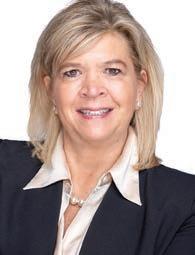
Marti Croll Taylor, MSN’93
DISTINGUISHED ALUMNA/ US AWARD
Marti Taylor has dedicated her career to advancing health care through leadership, innovation, and compassion. Starting as a staff nurse in the Cardiac Intensive Care Unit at Duke University Hospital in 1986, Marti quickly rose to leadership roles, including Director of Nursing for the Duke Heart Center and Associate Vice President of Cardiovascular Services for Duke University Health System. Her commitment to patient-centered care and quality led her to national leadership positions, such as President of the Saint Joseph’s Cardiovascular Program and CEO of University Hospital and the Ross Heart Hospital at The Ohio State University.
Marti’s influence extends beyond traditional health care settings. As President and CEO of OneFifteen, she developed a state-of-the-art addiction treatment campus in partnership with Google, addressing critical public health challenges with a holistic approach. Currently, she serves as CEO of OhioRISE and Vice President of Aetna Better Health of Ohio, supporting youth with complex behavioral health needs. Her work reflects a core belief in integrating compassion, innovation, and equity in health care.
Marti currently serves as the Chair of the Board of Trustees at Capital University, where she earned her undergraduate degree in nursing. Her dedication to education and mentorship has also been evident in her roles at Duke and beyond, shaping the future of health care through her leadership and vision. Throughout her career, Marti has been recognized for her contributions to nursing and health care, receiving numerous awards and serving on various boards, including the American Heart Association and Ronald McDonald House Charities. Marti credits her success to the values instilled during her time at Duke: a relentless pursuit of excellence, a commitment to community, and a holistic approach to health care. She lives in Dublin, Ohio, with her husband, Rodney, and their two sons, Zachary and Andrew.
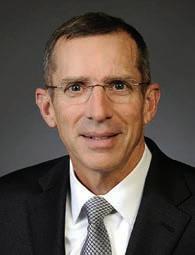
Brett T. Williams, BS’81, Major General, USAF (Retired)
HONORARY ALUMNUS AWARD
Major General (Retired) Brett T. Williams is a speaker, thought leader, executive coach, and board member, with specific expertise in cybersecurity and leader development. Following his 33 years of service in the U.S. Air Force, he co-founded IronNet Cybersecurity, serving in multiple positions until he retired in 2021. Today he serves on two corporate boards and enjoys coaching and mentoring Duke students. His last military assignment was Director of Operations, U.S. Cyber Command, where he was responsible for the operations and defense of Department of Defense networks as well as the planning and execution of offensive actions in support of national security objectives. General Williams is a highly experienced fighter pilot with more than 100 combat missions in the F-15C. General Williams has been a committed member of the Duke School of Nursing Board of Visitors since 2014. He served as chair from 2016 to 2018 and now holds the title of emeritus member. He also served on the Duke Health Board of Visitors from 2016 to 2019. He received the Forever Duke Award in 2021 for his exceptional volunteer service. A philanthropic supporter of Duke University, General Williams contributes to various initiatives, including the Iron Dukes, Trinity College of Arts and Sciences, Blue Devil Tower, Honoring Our Military Scholarship Fund, and the School of Nursing Annual Fund. He and his wife have also established the Tango-Williams Nursing Scholarship.
General Williams holds a Bachelor of Science in computer science from Duke University and three graduate degrees in management and national security studies. He met his wife of 41 years, Lt. Col. (Ret.) Marianne Tango Williams, BSN ’81, during their time in Air Force ROTC at Duke. The couple resides in Durham, N.C., where they actively support the university and mentor Air Force ROTC students nationwide. They are proud parents of two children, Mikaela and Sean, and have recently become grandparents.
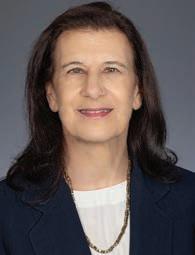
Martha “Marty” Cohn Romney, BSN’77
LIFETIME ACHIEVEMENT AWARD
Martha C. Romney holds a Master of Public Health from Drexel University, a Juris Doctor from Antioch School of Law, a Master of Science in Nursing from Columbia University, and a Bachelor of Science in Nursing from Duke University. Her diverse educational background laid a strong foundation for her multifaceted career in nursing, law, and public health. She has been a champion for those in need, working quietly and steadily without seeking fame or recognition.
Marty began her career on the postpartum ward at George Washington Hospital before moving to the Emergency Department at the Children’s National Medical Center. Her experiences there inspired her to pursue an MSN degree as a pediatric nurse practitioner, eventually leading to her position as clinical nurse specialist coordinator at the Child Protection Center/Sexual Abuse Team. Her commitment to advocacy propelled her to earn a legal degree, followed by roles in a small legal firm and several directorial positions at GlaxoSmithKline, focusing on medical/legal and regulatory affairs. Before retiring, she served as an associate professor at Thomas Jefferson University, where she taught public health law and ethics and engaged in various research projects and mentoring roles.
Throughout her career, Marty has served on numerous legal, medical, and public health boards and committees, often in executive roles. She has contributed to esteemed publications, including the American Journal of Public Health and Population Health Management, and served as an editor for the Medical-Legal National Institutes of the American Bar Association. Her dedication to advancing knowledge in the intersections of medicine, law, and public health is reflected in her numerous articles in peerreviewed journals and chapters in several books. Marty’s research focused on improving population health and access to care. She addressed health disparities, obesity, employer-based health programs, elder care, oncology, health policy, and integrating legal and medical services to enhance health literacy. Marty also worked on worksite wellness programs, community health assessments, and advocated for better representation of elderly populations in clinical trials.
On a personal note, Marty is a proud wife and mother, enjoying time with her family, including her grandson. She is a lifelong knitter and needlepoint enthusiast, an avid sports fan, and loves spending time at the beach. Currently, she volunteers at a local elementary school, tutoring students in reading, finding great joy in watching their progress and sharing the joy of learning. Marty’s selfless dedication and passion for helping others have made her a true advocate for the voiceless and a beacon of hope in her community.
1990s
MARY COLLEEN RUSSELL, MSN’94 published a children's book titled The Bumps On My Socks and Other Things That Bother My Brain. The book addresses sensory issues that so many children diagnosed with brain disorders deal with daily. She credits her daughter and several other family members that have lived with the challenges of sensory processing disorder as the inspiration for writing the book.

2000s
KAREN COURTNEY, MSN’02 was promoted to Professor at the School of Health Information Science at the University of Victoria in Victoria, British Columbia, Canada. She held a National Library of Medicine (NIH) Pre-doctoral Fellowship in Health Informatics Research while completing her PhD in Nursing at the University of Missouri - Columbia. She is the lead of the inter-institutional Digital Health Equity Group and co-chair of the Sex and Gender Working Group at Canada Health Infoway. She is a Fellow of the American Medical Informatics Association. Karen served as Graduate Advisor at the School of Health Information Science. She is a faculty affiliate member of the Institute of Aging and Lifelong Health and served as the Digital Health Cluster co-lead (2022 - 2024).
2010s
MICHAEL GRAHAM, DNP’14, began a new position as an administrative nursing supervisor (ANS) at the University of Minnesota Medical Center and Masonic Children’s Hospital in Minneapolis in January ’24. Dr. Graham continues to serve as a adjunct scholarly project chair and course instructor in the Catherine McAuley School of Nursing's DNP program at Maryville University, St. Louis. He is a member of the Duke School of Nursing's STTI Beta Epsilon Chapter Board of Directors and serves as a member of the Duke Twin Cities Alumni Planning Committee.
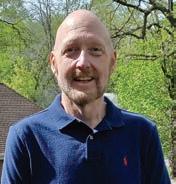
MARLENA BROKOB, ABSN’17, MSN’21 graduated from East Carolina University with a DNP in Leadership.
2020s
JULIE STEELE, DNP’20 CRNA is now Assistant Clinical Professor in the Nurse Anesthesia Program at the Bouvé College of Health Sciences, Northeastern University. She was elected Board member and appointed Chair of the AANA Bylaws and Resolutions Committee, MY 2025.
BRIAN ROACH, ABSN’21, graduated in May 2024 from the Yale School of Nursing with an MSN in the Family Nurse Practitioner specialty and is working as an APP in the Emergency Department at Mid Coast Hospital in Brunswick, Maine.
IN MEMORIAM
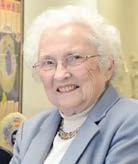
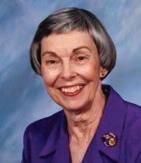
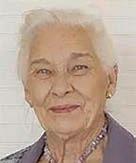
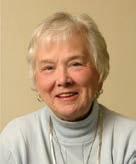

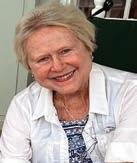
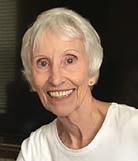
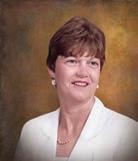
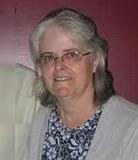
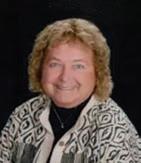
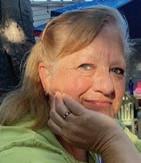
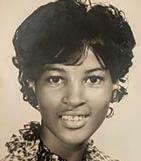


1940s
Elinor Brooks Caddell, BSN’48, MSN’60
1950s
Mary Lamond Wilson, RN’53, BSN’55
Anna Jane Cooper “Skippy” Painter, BSN’54
Barbara Burrus (Dunlevy), BSN’57
Nancy Walker Anderson, BSN’59, MSN’65
1960s
Janie Risch Fortney, BSN’60
Cherie Carter Hall, BSN’61
1970s
Joy Forsyth Reed, BSN’70
Jane Virginia Edmunds Edwards, BSN’71
Eldonna “Ducky” Shields-Kyle, MSN’72
Anna Jean Liles West, BSN’78
Marcy Garber Fish, BSN’79
1990s
Bertha R. Williams, MSN’96
2000s
Jason Lawrence Saavedra, MSN’01
Jodie Lee Bate, MSN’21
Elinor Caddell
Michael Graham Joy Reed
Mary Wilson Jane Edwards
Anna "Skippy" PainterEldonna Shields-Kyle
Barbara BurrusMarcy Fish
Nancy AndersonBertha Williams
Janie Fortney Jason Saavedra
Cherie Hall Jodie Bate

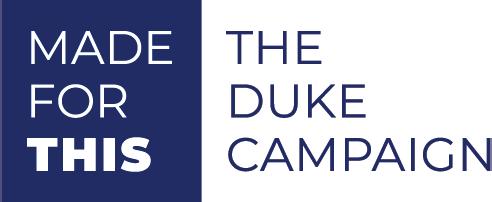


Duke University School of Nursing

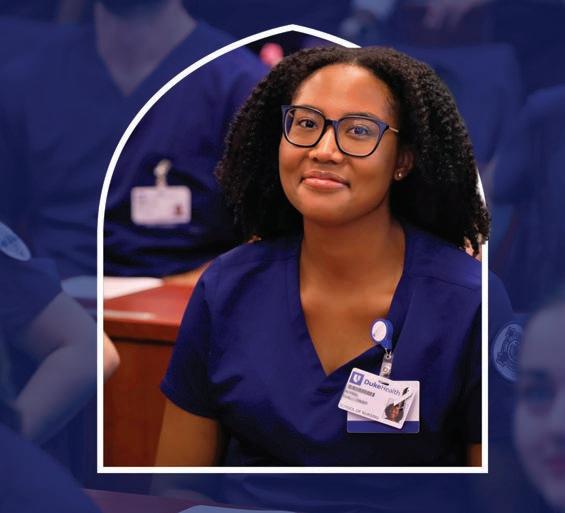
The support of our philanthropic partners enables us to shape the future of nursing by educating nurse leaders and innovators to become change agents and influencers to advance health equity.
As part of a university-wide effort, the School of Nursing is embarking on the MADE FOR THIS campaign to generate resources that will propel innovation, drive discovery, and improve lives around the world.

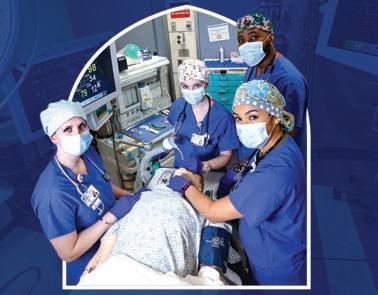
MADE FOR TRAINING THE NEXT GENERATION OF NURSING LEADERS
Campaign Priorities


Duke nursing students engage in hands-on clinical experiences, cutting-edge research, and community-based and global initiatives to prepare for a successful career. Support will help us continue to attract the brightest students who will become the next generation of nurse leaders, educators, and scientists.
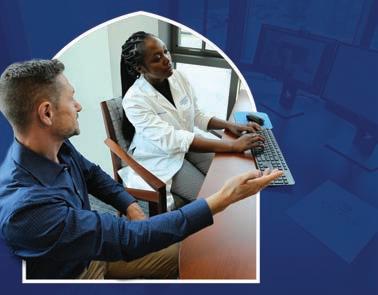
The Ruby L. Wilson Center for Nursing Science and Innovation (CNSI) provides pivotal resources empowering faculty and students to advance nursing and interdisciplinary science. Expanding this Center will elevate research opportunities for our faculty and students.


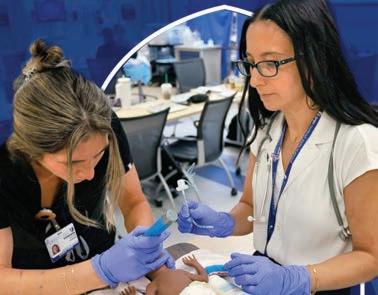

Duke faculty expertise and leadership help shape the curriculum, mentor future nursing leaders, and foster collaborations that drive impactful community initiatives. Endowed professorships allow us to retain and attract faculty dedicated to cutting-edge research and student development.
School of Nursing Giving
Investing in Duke University School of Nursing is investing in the future of healthcare. Your generosity empowers the next generation of nurses to lead with compassion, innovate with excellence, and transform lives globally.


Barbara Turner
MADE FOR ADVANCING NURSING SCIENCE AND INNOVATION
MADE FOR SUPPORTING SCHOOL OF NURSING FACULTY EXCELLENCE
Celebrating 2024 Fall Graduates
This past December, faculty, staff, families, and friends gathered to celebrate over 200 new graduates of Duke University School of Nursing.
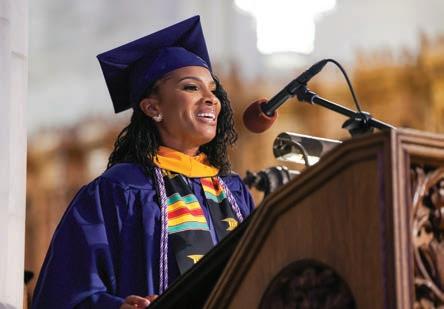
79 BSN
13 DNP
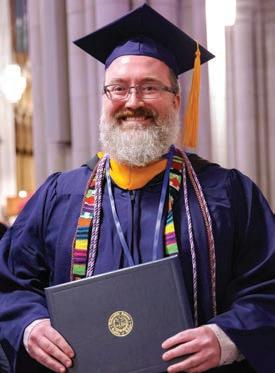

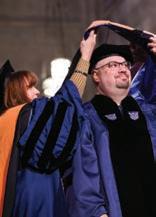
Despite a chilly start to the morning, spirits were bright and the Chapel was filled with laughter and applause as the graduates received their degrees.
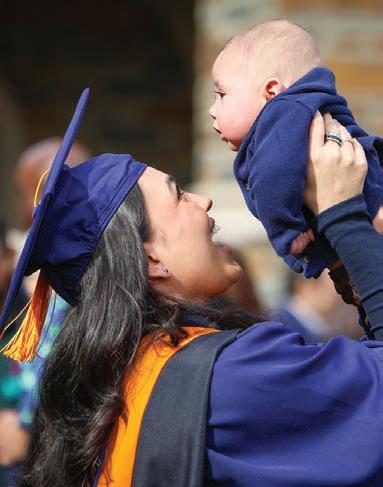
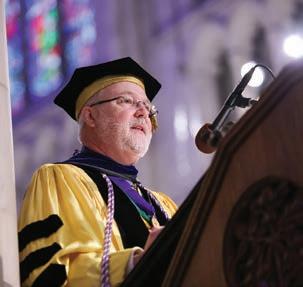
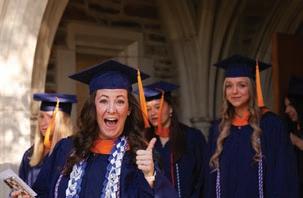

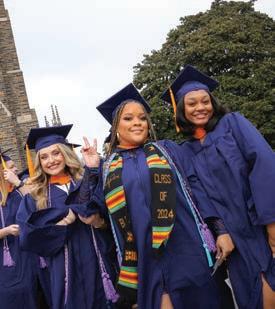
The Fall Graduation is particularly unique as family, friends, faculty, and staff are able to gather in historic Duke Chapel to celebrate the new graduates.
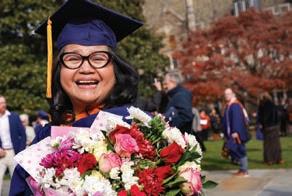
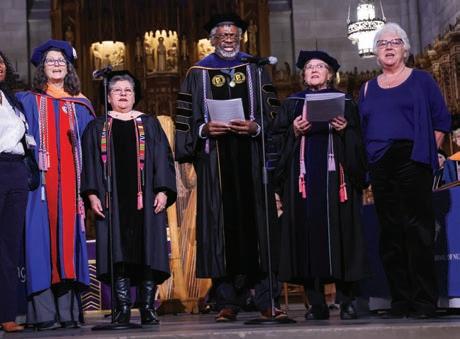
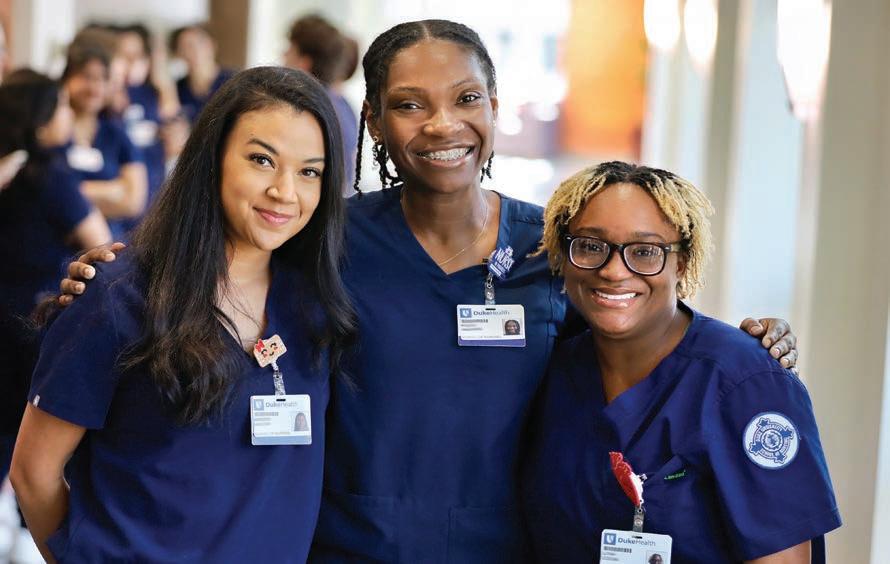
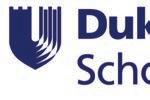
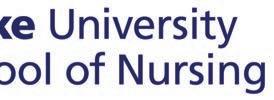
At Duke, we pride ourselves on our world-class programs dedicated to preparing nursing leaders in health care and research. Our extensive clinical network and partnerships give access to unparalleled professional opportunities and connections.
Here, you'll join a community of change-makers committed to advancing health equity.
TOP RANKED NURSING PROGRAMS







PRE-LICENSURE PROGRAM
MSN NURSE PRACTITIONER MAJORS
MSN SYSTEM MAJORS
DNP PROGRAMS
DNP - NURSE ANESTHESIA
SPECIALTY CERTIFICATES
PHD











